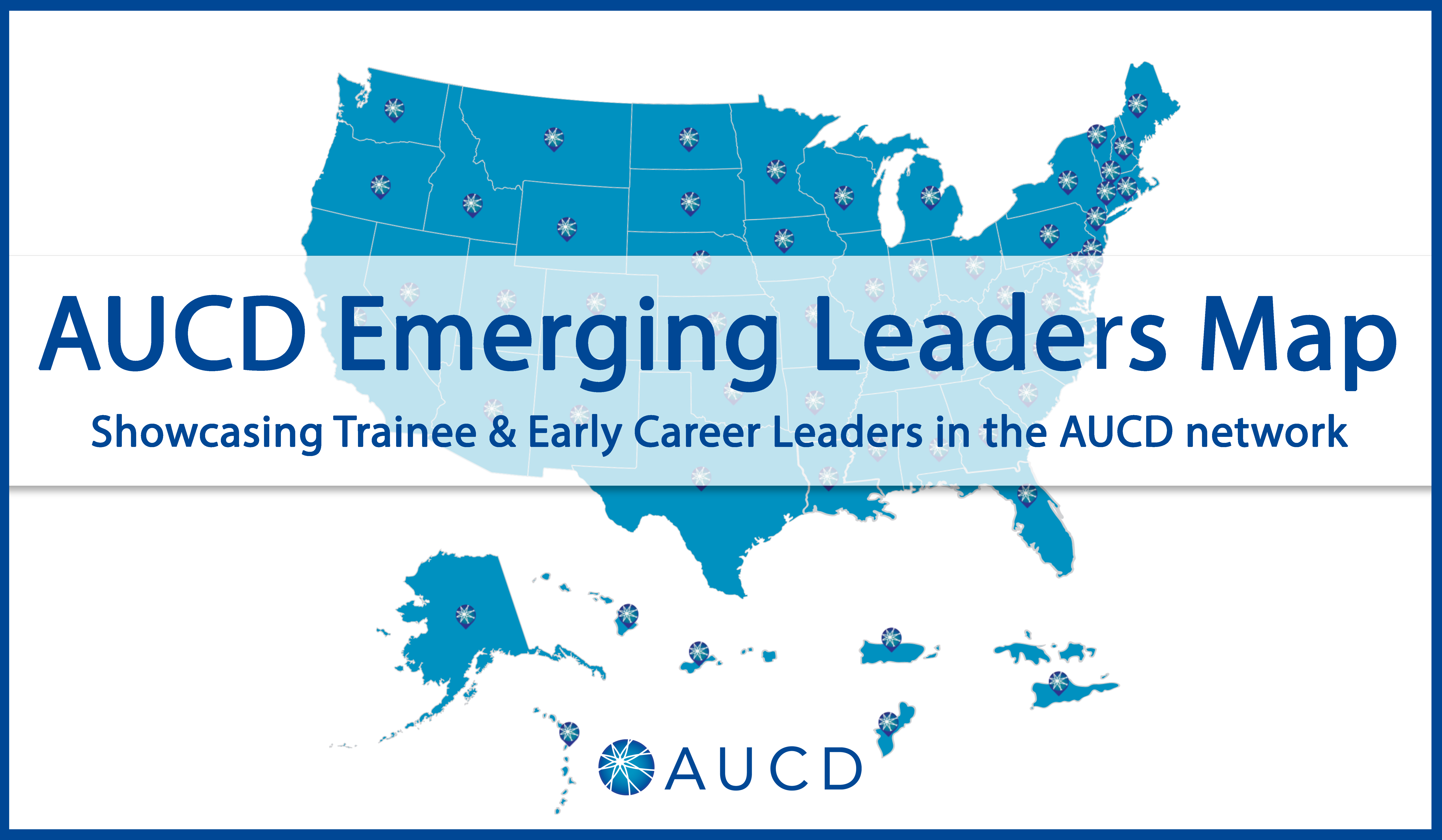
The AUCD Emerging Leaders Map highlights the contributions of diverse trainees across AUCD's network. The theme of this year’s map is "Promoting Health Equity: Identifying Access Barriers and Protecting Rights to Services for People with Disabilities."
Our hope for this year’s map is to showcase the many diverse ways that emerging leaders are working to enhance access for people with disabilities and facilitate dialogue and collaboration between centers. The Emerging Leaders Map is a great way to explore ongoing activities in the network, to brainstorm ideas for your program or center, and to use as a networking resource for future opportunities!
Questions about the AUCD Emerging Leaders Map should be directed to AUCD's Maureen Johnson.
AL: Civitan International Research Center and Sparks Clinics,
Jo-Ann Moulin
AR: Partners for Inclusive Communities (Arkansas UCEDD),
Shannon Rivas
AZ: ArizonaLEND,
Kristin Robertson
AZ: Sonoran UCEDD,
Mahkyla Howes
AZ: ArizonaLEND,
Samantha Gorta
CA: Tarjan Center at UCLA,
Jasper Estabillo
CA: Northern California LEND,
Joseph J Armendarez
CA: Northern California LEND,
Stephanie Tangsombatvisit
CO: JFK Partners, University of Colorado Denver,
Regina Rodriguez Sisneros
DE: Center for Disabilities Studies, University of Delaware,
Emily Curtin
FL: Florida Center for Inclusive Communities, University of South Florida ,
Caroline Muster
IA: Center for Disabilities and Development (Iowa LEND) ,
Amber Alaniz
IA: Center for Disabilities and Development (Iowa LEND) ,
Michaela Curran
IA: Center for Disabilities and Development (Iowa LEND) ,
Dayrin Lovan
ID: Idaho Center on Disabilities and Human Development,
Jacqueline Baxter
ID: Idaho Center on Disabilities and Human Development,
Ernesto Marquez Montes
IL: Institute on Disability and Human Development (Illinois UCEDD),
Caitlin Crabb
IL: Institute on Disability and Human Development (Illinois UCEDD),
Timotheus Gordon Jr.
IL: Illinois LEND,
Jessica Hinman
IL: Illinois LEND,
Sandra Vanegas
IN: Riley Child Development Center,
Katie Friedericks
KS: Center for Child Health and Development (Kansas UCEDD),
Jessie Kiblen
KS: Center for Child Health and Development (Kansas LEND),
Kiki Oyetunji
KY: University of Kentucky Human Development Institute (Kentucky UCEDD),
Austin Nugent
MA: Eunice Kennedy Shriver Center,
Winston Kennedy
ME: Center for Community Inclusion and Disability Studies, University of Maine,
Hibo Omer
MI: Michigan LEND,
Heather Eckner
MN: Institute on Community Integration (Minnesota LEND),
Deqa A. Farah
NC: Carolina Institute for Developmental Disabilities ,
Jacklyn Googins
NY: Strong Center for Developmental Disabilities, University of Rochester,
Luticha A Doucette
NY: Westchester Institute for Human Development ,
Sandra Duarte
OH: LEND Program at Cincinnati Children's Hospital and the University of Cincinnati,
Sue Ram
OH: LEND Program at Cincinnati Children's Hospital and the University of Cincinnati,
Teresa Smith
OK: Oklahoma LEND,
Jessica Huddleston
OK: Oklahoma LEND,
Emily Isbill
PA: The Institute on Disabilities at Temple University,
Grace Fay Cooper
TN: Boling Center on Developmental Disabilities at UTHSC,
Jessica Stevens
TN: Vanderbilt Consortium LEND,
Tatum Gross
TX: LoneStar LEND at University of Texas Health Science Center at Houston,
Jennifer R. Crawford
UT: URLEND/CDHD,
Adrienne Seamans
WA: Washington LEND,
Sampada Deshpande
WA: Washington LEND,
Anisha Srinivasan
WI: Waisman Center (WI LEND),
Ida Winters
WI: Waisman Center (WI LEND),
Markayle Schears
WV : Center for Excellence in Disabilities at West Virginia University,
Mustafa Rfat
Jo-Ann Moulin
Discipline: Family
Civitan International Research Center and Sparks Clinics
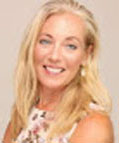 Jo-Ann Moulin is a LEND/UCEDD family trainee at the UAB Civitan International Research Center and Sparks Clinics in Birmingham, AL. She was a former PPC family trainee at Children's Hospital of Alabama at Birmingham. She is married and has 3 grown daughters. Her oldest daughter was diagnosed with cerebral palsy at 10 months of age and is a senior at Auburn University.
Jo-Ann Moulin is a LEND/UCEDD family trainee at the UAB Civitan International Research Center and Sparks Clinics in Birmingham, AL. She was a former PPC family trainee at Children's Hospital of Alabama at Birmingham. She is married and has 3 grown daughters. Her oldest daughter was diagnosed with cerebral palsy at 10 months of age and is a senior at Auburn University.
Image Description: Jo-Ann, a white woman with long blonde hair and green eyes is wearing a floral sleeveless top and smiling at the camera.
1. What does health equity mean to you?
I believe health equity is providing all people equal access to healthcare so that they can have the best health possible.
2. How do you plan on promoting health equity within your community?
I plan on promoting health equity in my community by staying connected with the Maternal Child Health programs in my community and reaching out to policymakers to build relationships and share my story of raising a daughter with a disability. For example, how systems, such as Medicaid and Medicare, have helped her have what she needs to live a healthy and productive life. I also plan to continue to be an advocate for all people with disabilities as well as those with special healthcare needs. I plan to stay connected to disability councils such as AUCD's Council on Leadership and Advocacy (COLA), Alabama Council on Developmental Disabilities (ACDD), and Alabama Disabilities Advocacy Program (ADAP) and stay updated on policies in action so I can be a better advocate for others as well as for my own family.
3. What are your professional and/or personal goals as an Emerging Leader within and outside the AUCD Network?
I plan to continue to grow and learn in the advocacy field by staying connected with AUCD and the disability advocacy groups within my community. I plan to use what I have learned to volunteer in the community and be an advocate for individuals with disabilities as well as for my daughter with cerebral palsy.
Shannon Rivas
Discipline: Self Advocacy
Partners for Inclusive Communities (Arkansas UCEDD)
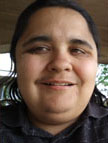 I'm the Committee Coordinator for Arkansas People First, in addition to being a LEND Self Advocacy Trainee. I've been a resident of Hot Springs, Arkansas for over 43 years.
I'm the Committee Coordinator for Arkansas People First, in addition to being a LEND Self Advocacy Trainee. I've been a resident of Hot Springs, Arkansas for over 43 years.
Image Description: I'm wearing a black polo shirt and blue jeans and I'm standing outside on the front porch of my house.
1. What does health equity mean to you?
Health equity means that each person has a fair opportunity to stay healthy and to remove barriers related to poverty, discrimination, lacking employment, lacking education, lacking housing, and health care.
2. How do you plan on promoting health equity within your community?
I would like to tell the community about having a healthy lifestyle in their professional and personal lives and promoting awareness to anyone who wants to advocate for employment, education, housing, and health care.
3. What are your professional and/or personal goals as an Emerging Leader within and outside the AUCD Network?
My professional goal is to work with self-advocates who would like to participate in the LEND Program. My personal goal is to continue being a successful self-advocate and helping other people make decisions about what they want and need and speaking up for what they want to do to achieve a better life.
Kristin Robertson
Discipline: Special Education
Partners for Inclusive Communities (Arkansas UCEDD)
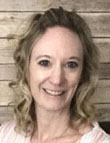
I was a special education teacher for 9 years, working with students with emotional and behavioral disorders. My research passion is focused on classroom interventions for students with emotional and behavioral disorders that support teachers and students inclusion in the mainstream classroom. I am finishing my 3rd year as a doctoral student at the University of Arizona.
Image Description: A curly hair blonde woman, with blue eyes. She is wearing a pastel-colored button-up shirt with a wood backdrop.
1. What does health equity mean to you?
Removing systemic barriers that prevent individuals with disabilities from fully receiving the health benefits they need to be productive and fully included members of society.
2. How do you plan on promoting health equity within your community?
Advocacy, providing information, and questioning the status quo.
3. What are your professional and/or personal goals as an Emerging Leader within and outside the AUCD Network?
Being involved in advocacy on the local, state, and federal levels to support restorative justice and inclusive educational practices.
Mahkyla Howes
Discipline: Disability Policy
Sonoran UCEDD
 I am Deaf and a paraplegic student and soon I will be a graduate student at the University of Arizona. Being a second generation American who was raised as a military brat I lived in 4 different countries before the age of 18. I am a advocate for disability rights and social justice.
I am Deaf and a paraplegic student and soon I will be a graduate student at the University of Arizona. Being a second generation American who was raised as a military brat I lived in 4 different countries before the age of 18. I am a advocate for disability rights and social justice.
Image Description: Mahkyla has orange eyeshadow and large lashes, wearing a green sweatshirt with dark brown curly hair in a bun at the top of her head.
1. What does health equity mean to you?
It means that health is not synonymous with being able-bodied or the concept of "quality of life". Having care and resources that are accessible and providers who not only have cultural competence but cultural humility, as well. Health quality also means that emergency and safety plan development includes those of marginalized identities in mind.
2. How do you plan on promoting health equity within your community?
I have spoken to two different disability commissions about emergency preparedness in connection to disability. I have also written legislators about how my county has distributed the vaccine, leaving disabled people out. I plan to continue speaking to leaders in city, county, and state governments to bring awareness of health equity as well and continue to develop policy briefs.
3. What are your professional and/or personal goals as an Emerging Leader within and outside the AUCD Network?
As a disabled person myself, I want the disabled community to be an intrinsic part of the push for disability rights and overall accessibility and equity. I want to become a director of disability resources at the university level as a career. I also want to continue to develop disability policies with the UCEDD that are for disabled people by us.
Samantha Gorta
Discipline: Social Work
ArizonaLEND
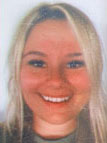 I currently am going into the final year of my graduate program. I am working towards obtaining my MSW. My passion to work with others (specifically youth/families) was driven by directing a summer camp for underprivileged youth. I feel that I am patient, empathetic, kind, and goal-oriented. Not only do I have a passion to help others, my true passion is to help others see the strengths within themselves, set goals for themselves, and be empowered as well as resilient to accomplish whatever it is they desire in their life.
I currently am going into the final year of my graduate program. I am working towards obtaining my MSW. My passion to work with others (specifically youth/families) was driven by directing a summer camp for underprivileged youth. I feel that I am patient, empathetic, kind, and goal-oriented. Not only do I have a passion to help others, my true passion is to help others see the strengths within themselves, set goals for themselves, and be empowered as well as resilient to accomplish whatever it is they desire in their life.
Image Description: Sam, a Caucasian woman, with long blonde hair, is smiling at the camera. She wears a green shirt.
1. What does health equity mean to you?
Health equity to me means providing for members in our community for them to have the resources to reach their fullest potential. To me, it does not mean giving everyone the same thing, but it means, meeting people where they are at. Every person and every family's story is unique and different. By catering to each member of society to reach their fullest potential, by meeting them where they specifically are at, we can support them in achieving what they need. In relation to health, we are meeting individuals and families where they feel they are at in terms of their health needs, and providing them with the support they need to continue to grow.
2. How do you plan on promoting health equity within your community?
I plan on being an active listener within my community. We learn skills from our textbooks and schools, but the real work comes from interacting with others in our community. By applying the skillset I have learned from school and the AZLEND, I have gained empathetic skills to interact with others. By combining these skills with hearing and understanding what members in the community feel they need, I can assist in advocating for health equity in my community. I plan to utilize what I know about my community in combination with hearing the actual voices of the community speak to what their needs are.
3. What are your professional and/or personal goals as an Emerging Leader within and outside the AUCD Network?
Once I graduate from my master's program, I plan to become a licensed therapist for children. With that comes, of course, working with families of these children. I plan to utilize my skillset from LEND, to provide a holistic approach to my practice to be able to work with various backgrounds. In addition, I always want to be a role model and mentor for those behind me. I plan to stay involved in LEND and support future trainees as best as I can to ensure they have the great experience and support I did. I love the access to the various presentations through the AUCD network. I feel this is a great way to not only be informed of new topics but also connect with others across the nation. I plan to continue to be involved with the AUCD community by staying informed of these events.
Jasper Estabillo
Discipline: Psychology
Tarjan Center at UCLA
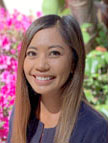 Jasper A. Estabillo, Ph.D. is a Clinical Psychology Postdoctoral Fellow in the UCLA PEERS Clinic and a Postdoctoral Scholar in the UCLA Department of Psychology. She received her doctorate in Clinical Psychology from Louisiana State University and completed her predoctoral internship at the UCLA Semel Institute for Neuroscience & Human Behavior in the Autism and Neurodevelopmental Disabilities track. She has worked with individuals with developmental disabilities in a variety of research and clinical settings, and she has extensive experience in applied behavior analysis. Her postdoctoral work focuses on training community mental health providers in evidence-based interventions (EBI) for children on the autism spectrum and agency leadership on facilitating implementation of EBI. In the UCLA PEERS Clinic, she leads the PEERS for Young Adults social skills groups.
Jasper A. Estabillo, Ph.D. is a Clinical Psychology Postdoctoral Fellow in the UCLA PEERS Clinic and a Postdoctoral Scholar in the UCLA Department of Psychology. She received her doctorate in Clinical Psychology from Louisiana State University and completed her predoctoral internship at the UCLA Semel Institute for Neuroscience & Human Behavior in the Autism and Neurodevelopmental Disabilities track. She has worked with individuals with developmental disabilities in a variety of research and clinical settings, and she has extensive experience in applied behavior analysis. Her postdoctoral work focuses on training community mental health providers in evidence-based interventions (EBI) for children on the autism spectrum and agency leadership on facilitating implementation of EBI. In the UCLA PEERS Clinic, she leads the PEERS for Young Adults social skills groups.
Image Description: A Filipina-American woman with tan skin and dark hair smiles at the camera. She is wearing a navy blue blazer, white blouse, and black trousers. She is seated outside on a sunny day with bright pink flowers and greenery behind her.
1. What does health equity mean to you?
Health equity to me means justice in the pursuit of and access to a healthy life. This requires partnerships between stakeholders to remove barriers to health and to provide fair and quality opportunities to individuals who are most in need.
2. How do you plan on promoting health equity within your community?
I plan to promote health equity in my community by partnering with community-based services, families, and stakeholders. As a clinician and researcher, I aim to collaborate with communities to identify needs and to use a partnered approach to create meaningful change.
3. What are your professional and/or personal goals as an Emerging Leader within and outside the AUCD Network?
My goals are to continue working as a researcher on community-partnered projects to expand access to evidence-based interventions and as a clinician providing mental health services to the disabled community. As a scholar-activist, I also aim to work with local, state, and federal agencies to create policies that better support our communities and promote health equity.
Joseph J. Armendarez
Discipline: Psychology
Northern California LEND
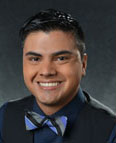
Image Description: Joseph, a Latino man with short black hair that is parted to the right. The background is dark gray. He smiles at the camera and wears a dark blue collared shirt with a black vest and a blue, white, and gray diagonal stripe bow tie.
1. What does health equity mean to you?
The concept of health equity is ensuring that socially constructed factors are no longer predictors of life expectancy. When zip codes and environmental conditions divide groups, then this demonstrates health inequities. The promotion of health equity is professionals working together to create communities that focus on prevention work. In essence, professionals might have to seek out more creative ways to fund health equity work (i.e., outside typical health insurance coverage). Health equity is important for all of us and can help everyone achieve more.
2. How do you plan on promoting health equity within your community?
I envision that every child five and younger, including their families, should have the ability to participate in free high-quality educational and mental health supports. Research is clear that these pivotal, early years are transformative for children and families, so my ambition is to dedicate my career to ensuring policy aligns with research and practice. This preventative focus would radically change the heavily burdened healthcare and special education system.
3. What are your professional and/or personal goals as an Emerging Leader within and outside the AUCD Network?
My professional goal is to connect with others to collaborate on grants or research. If we can build momentum across states for more early prevention work and services that are not typically billed by insurance, then I believe real change can start. The research on Adverse Childhood Experiences (ACEs) indicates we have to do more to protect one of the most vulnerable populations, young children. Given the connections with other leaders, my vision is to continue exploring more creative ways to do this important work on a larger scale.
Stephanie Tangsombatvisit
Discipline: Medicine - Developmental-Behavioral Pediatrics
Northern California LEND
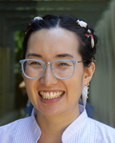 I am a Developmental-Behavioral Pediatrics fellow and LEND trainee at UC Davis MIND Institute. I am a first generation Asian American, born into a large Thai family. I truly consider the community that I work with - my colleagues, my patients, and their families - a part of my own family and celebrate the rich diversity I am immersed in every day.
I am a Developmental-Behavioral Pediatrics fellow and LEND trainee at UC Davis MIND Institute. I am a first generation Asian American, born into a large Thai family. I truly consider the community that I work with - my colleagues, my patients, and their families - a part of my own family and celebrate the rich diversity I am immersed in every day.
Image Description: Steph is an Asian woman with black braided hair. She wears blue glasses and a big grin. She is also wearing a white blouse with embroidered blue flowers.
1. What does health equity mean to you?
Health equity is the daily work of educating myself and others, building partnerships with my families and my community, speaking out, and advocating to break down the barriers to adequate healthcare for marginalized and vulnerable populations. For me, health equity starts with the acknowledgment of the injustice in our healthcare system and will be a lifelong call to stand up against it.
2. How do you plan on promoting health equity within your community?
As a medical professional, I acknowledge the damage our profession has done to marginalized and vulnerable populations. I plan to rebuild trust in building partnerships with the community organizations already doing the work to improve access to care. I will work to amplify the voices and experiences of my patients and families and push for change within the medical community. I am currently working with Sankofa, a Sacramento-based support group organized by and for Black families with ASD/NDD, to operationalize their model and extend their reach in other counties.
3. What are your professional and/or personal goals as an Emerging Leader within and outside the AUCD Network?
After completing my Developmental-Behavioral Pediatrics fellowship, I hope to return to Oakland, California, where I trained and worked as a general pediatrician and where my patients and families often faced challenges to accessing developmental and behavioral services. My goal is to provide culturally and linguistically sensitive care to underserved children in a federally qualified health center setting and to teach pediatricians in training to do the same.
Regina Rodriguez Sisneros
Discipline: Multicultural Cultural Diversity
JFK Partners, University of Colorado Denver
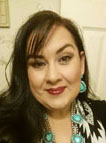
I am a Certified Brain Injury Specialists, and I work for Mindsource Brain Injury Program in Colorado. I am also a JFK Lend Fellow. My discipline is Cultural Diversity/Inclusion. I completed the Georgetown University Leadership Institute for Cultural Diversity. I enjoy collaboration and working with our communities to support inclusion and equity.
Image Description: Latina Female with long brown hair, wearing a black shirt, and black and white Aztec designed vest. Navajo Turquoise Earrings and Navajo Turquoise Squash Blossom necklace.
1. What does health equity mean to you?
To me, health equity means assuring that everyone has the opportunity to thrive. We need to create access to services by eliminating barriers to systems like healthcare, transportation, education, or other types of services. But access comes in many ways and we have to be creative about what access means to an individual and how we are providing their entryway, that meets their needs and accommodates them.
2. How do you plan on promoting health equity within your community?
I plan on promoting health equity through my continued education and outreach. It is very important to me that I work with communities to understand their unique needs. I work with our direct client services to understand those needs and then work on incorporating as many training opportunities as I can into our workdays so that we can empower our staff to know the community we are working with. I work on policy development and process development so that we modify them to accommodate changes that may or may not be working for our clients.
3. What are your professional and/or personal goals as an Emerging Leader within and outside the AUCD Network?
To continue to enhance health equity for all. It is important that when decisions are made, we are inclusive of all communities and it is my goal to work on creating access to health care and services as well as promote self-advocacy within underserved populations.
Emily Curtin
Discipline: School Psychology
Center for Disabilities Studies, University of Delaware
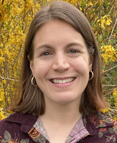 Emily Curtin is a school psychology M.A./Ed.S. student at the University of Delaware and will graduate in May 2021. She is currently an intern in the Red Clay Consolidated School District and has accepted a position with the Red Clay District Autism Team for the 2021-2022 school year. As a graduate assistant at the University of Delaware Center for Disabilities Studies, Emily worked on statewide autism initiatives. She was also a 2019-2020 LEND trainee and assisted with toddler autism evaluations during her interdisciplinary practicum at Child Development Watch, Delaware’s Early Intervention program.
Emily Curtin is a school psychology M.A./Ed.S. student at the University of Delaware and will graduate in May 2021. She is currently an intern in the Red Clay Consolidated School District and has accepted a position with the Red Clay District Autism Team for the 2021-2022 school year. As a graduate assistant at the University of Delaware Center for Disabilities Studies, Emily worked on statewide autism initiatives. She was also a 2019-2020 LEND trainee and assisted with toddler autism evaluations during her interdisciplinary practicum at Child Development Watch, Delaware’s Early Intervention program.
Email Address: [email protected]
Image Description: Emily has shoulder-length brown hair and is smiling at the camera. She is wearing a burgundy button-up shirt with a floral pattern and gold hoop earrings. She is in front of a yellow bush.
1. What does health equity mean to you?
Health equity means that everyone has access to the high-quality care they need to achieve wellness. Services must be accessible regardless of ability, race and ethnicity, socioeconomic status, gender, sexual orientation, and immigration status. Health equity encompasses not only physical health, but also mental, emotional, and spiritual wellness. Equity recognizes that all of our health needs are different, and all are important and necessary.
2. How do you plan on promoting health equity within your community?
As a soon-to-be school psychologist who will be working with autistic students, I plan to promote health equity by connecting students and families to providers who center the rights, preferences, and needs of the autistic community. I also plan to raise awareness of disparities in access to autism assessment and supports and advocate for ending barriers to these services. Additionally, I will educate my colleagues on biases that lead to students being overlooked for special education services.
3. What are your professional and/or personal goals as an Emerging Leader within and outside the AUCD Network?
My primary professional goal is to be an ally to autistic students and help them live self-determined lives. I want to shift autism support away from what makes neurotypical people comfortable and toward what autistic students need to be healthy and authentic. A personal goal is to become a stronger advocate for healthcare reform at the state and federal levels. In the future, I’d also like to obtain a doctorate and assist with research that is important to the autistic community.
Caroline Muster
Discipline: Social Work
Florida Center for Inclusive Communities, University of South Florida
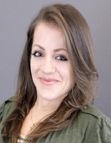 Caroline is a second-year PhD in Social Work student at USF, and is currently completing her last semester of coursework. She earned her Master of Social Work (MSW) degree from Texas State University in 2012, after earning her Bachelor of Arts (BA) in Psychology from Texas State in 2010. In 2017, Caroline became a Licensed Clinical Social Worker (LCSW) in the state of Florida. Her research interests include the experiences of women with disabilities, the intersection of disability and other identities, and encounters between police officers and people with disabilities.
Caroline is a second-year PhD in Social Work student at USF, and is currently completing her last semester of coursework. She earned her Master of Social Work (MSW) degree from Texas State University in 2012, after earning her Bachelor of Arts (BA) in Psychology from Texas State in 2010. In 2017, Caroline became a Licensed Clinical Social Worker (LCSW) in the state of Florida. Her research interests include the experiences of women with disabilities, the intersection of disability and other identities, and encounters between police officers and people with disabilities.
Image Description: Caucasian woman with green eyes and long, wavy, light brown hair smiling with her mouth closed, wearing a green and white striped shirt covered with a green blouse, and also wearing a thin, gold necklace and small stud in the left nostril of her nose.
1. What does health equity mean to you?
Health equity is the complete and unlimited access to the biopsychosocial determinants of quality living.
2. How do you plan on promoting health equity within your community?
While completing the dissertation for my Ph.D. in Social Work program over the next two years, I will promote health equity within my community by maintaining my LCSW certification, so that I may provide quality mental health care to anyone in need of this support.
3. What are your professional and/or personal goals as an Emerging Leader within and outside the AUCD Network?
My professional goals as an Emerging Leader are to complete my Ph.D. in Social Work program in 2023 and to subsequently serve in the field of public policy as a social work researcher and macro-level practitioner, to advance legislation that promotes quality of life for people with disabilities
Sahana Shankar
Discipline: Medicine
Mailman Center for Child Development, University of Miami Miller School of Medicine
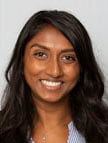
Sahana Shankar is a medical student at the University of Miami Miller School of Medicine who received her bachelor’s degree in Neuroscience from the University of Miami. She completed her LEND training at the Mailman Center for Child Development at the University of Miami Miller School of Medicine, where she continues to be involved in many projects focused on improving the care of people with disabilities, including curriculum development, leadership programs, and the development of a medical home for people with disabilities. She has a younger sister with Floating-Harbor Syndrome who inspires her every day and has catalyzed her work with the disability community. Sahana is passionate about developing projects within healthcare systems that reflect the needs of people with disabilities in order to provide them with optimal care.
Image Description: : Sahana Shankar is an Indian woman with wavy black hair past her shoulders. She smiles at the camera and is wearing a blue and white striped blouse with a blazer and a silver necklace.
1. What does health equity mean to you?
Equity is embodied by a framework that provides a platform for all to have the opportunity to lead the life they desire. In a health system where equity pervades, optimal care is delivered to all, providers are knowledgeable of different barriers that exist for minority groups and are equipped to ameliorate them, and patients feel recognized and valued. To me, health equity means advocating for patients by understanding their specific needs and leveraging available resources to ensure that they have the opportunity to reach their health goals. If resources to meet their needs are not available, equity means doing everything in one’s power to create them.
2. How do you plan on promoting health equity within your community?
I hope to dismantle the barriers to care that people with disabilities experience by understanding the needs of the local community and by continuing to work alongside disability community advocates to ensure those needs are met. I will always take actions that center the voices of people with disabilities. By continuing to develop projects that will create more informed health care providers, from medical school curriculum to trainings and guides for practicing professionals, I strive to equip providers with the knowledge and skills necessary to care for people with disabilities. Working on campaigns and hosting community events to highlight the needs of people with disabilities will increase local awareness and foster more disability community advocates, thereby creating a positive feedback loop of champions of health equity.
3. What are your professional and/or personal goals as an Emerging Leader within and outside the AUCD Network?
My goal is to be a lifetime advocate for people with disabilities. I want to constantly listen, learn and implement. I aspire to be on interdisciplinary teams, engaged with the community, and the creator of actionable change that reflects the needs of the local disability community. Alongside the other Emerging Leaders, I hope to create a network of providers who are self-advocates or have particular experience with people with disabilities who can serve as “experts' in situations that other providers may feel unprepared to navigate. This body of providers could also serve as an advocacy group and could create resources for health systems and providers to equip them with the knowledge they need to provide optimal care for people with disabilities.
Amber Alaniz
Discipline: Social Work
Center for Disabilities and Development (Iowa LEND)
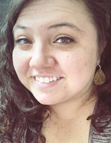
I am a bicultural, cisgender woman with chronic health conditions earning my masters social work. I have been a direct support professional for the last four years. Prior to that experience, I was a domestic violence and sexual assault prevention advocate.
Image Description: This image includes a young white woman smiling with long dark curly hair. She is wearing a brown and white blended shirt with golden leaf-designed clay earrings.
1. What does health equity mean to you?
Health equity to me means implementing preventative policies and practices to support all people. The idea of health equity is possible and could be put into practice. However, it takes acknowledging that each person deserves the specific supports to obtain their best health. It means not classifying healthcare diagnoses as "special healthcare needs" but rather, recognizing all people deserve support for their healthcare diagnoses. Often, our health outcomes are related to generations before us, the environment we are in, and the lack of systemic support.
2. How do you plan on promoting health equity within your community?
I have a few ideas in mind on how to support health equity in my community. I am going to be attending the University of Iowa School of Social's Doctoral Program. In this program, I wish to implement inclusive research for people with disabilities, their families, and people with undiagnosed/misdiagnosed disabilities. I plan to earn a concentration in Public Health and want to implement all of my research ideas from that lens.
3. What are your professional and/or personal goals as an Emerging Leader within and outside the AUCD Network?
I hope to be able to assess the lack of access to preventative healthcare for all people within several institutions like child welfare, criminal legal system, housing, vocational, religion, and immigration. Throughout Iowa, this will be challenging and possibly includes an entire cultural shift. However, as humbling and perplexing as that seems, I am so respectfully ready to commit to that research. Another goal that I have is to be able to continue having balance in my life, moving forward. In general, it is so critical to have a balance, but specifically, I want to be able to maintain balance with self-care and implementing community care. This will support me. Lastly, I want to be able to continue to grow as a person, leader, and scholar. As a first-generation college student, I had never planned to become a "scholar". Yet, here I am putting it into a goal. It is important to me because the field of social work is so important to my healing, but also to all of the people within our communities. We all deserve better, I want everyone to know that.
Michaela Curran
Discipline: Public Health
Center for Disabilities and Development (Iowa LEND)
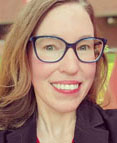
I earned my PhD in Sociology from the University of California, Riverside in 2020. My research focuses on health equity, the social determinants of health, and disability access and accommodations. I am a 2020-2021 LEND trainee and a Provost's Postdoctoral Fellow in the Department of Community and Behavioral Health (in the College of Public Health) at the University of Iowa.
Image Description: Michaela, a white woman with long blonde hair and light blue eyes, is outside on a sunny day. She wears thick, blue rimmed glasses. She is wearing a black suitcoat and a v-neck crimson shirt. She is smiling.
1. What does health equity mean to you?
Health equity means that everyone has the opportunity to attain the best health possible for them. It means working to dismantle systems of oppression like racism, sexism, and ableism to ensure that everyone has equitable life chances.
2. How do you plan on promoting health equity within your community?
I am a postdoctoral researcher seeking to make access and accommodation processes more equitable for all people with disabilities. Most of my work focuses on making higher education more accessible for underrepresented (e.g., BIPOC, LGBTQ+, low income) students with disabilities, as well as raising awareness about the unique challenges that students with invisible disabilities face.
3. What are your professional and/or personal goals as an Emerging Leader within and outside the AUCD Network?
My main professional goal is to further establish a health equity research program to inform policy interventions. I also hope to teach and mentor the next generation of public health scholars. In terms of personal goals, I hope to become an advocate and raise awareness about equitable disability access. This goal includes learning how to engage with lawmakers and the general public about disability-related issues.
Dayrin Lovan
Discipline: Family
Center for Disabilities and Development (Iowa LEND)
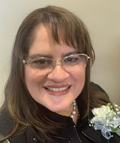
I love to help people especially if they have a disability and advocate for them.
Image Description: In this picture, I was being ordained as a minister for the Hispanic community
1. What does health equity mean to you?
I love to help the Hispanic communities .
2. How do you plan on promoting health equity within your community?
Having courses and telling them about the importance of good information and what is happening in our community.
3. What are your professional and/or personal goals as an Emerging Leader within and outside the AUCD Network?
I work with the compassion organization helping.
Jacqueline Baxter
Discipline: Occupational Therapy
Idaho Center on Disabilities and Human Development

My name is Jacquie Baxter and I am 23. I graduated from the University of Idaho in Moscow, ID, where I was a UCEDD trainee in 2020. I am currently living in Pocatello, ID, and attending Idaho State University for my masters degree in occupational therapy. I absolutely love traveling, cooking, and spending time with those around me.
Image Description: Jacquie has curled, brown hair and is smiling for a graduation picture, wearing her graduation cap. She is wearing a white lace dress with her arms crossed in front of her.
1. What does health equity mean to you?
Equity in general to me, means, that not everyone starts on an equal playing field. Some people are born with greater or lesser opportunities for no reason other than where or what they were born into. This concept directly relates to health. Not everyone has the same opportunities to get affordable, accessible, or quality healthcare as others do. Health equity to me would mean that everyone, regardless of circumstance, would be able to receive health care to treat symptoms, prevent illness, and promote overall good health and well-being.
2. How do you plan on promoting health equity within your community?
I am from an overall very rural and conservative-leaning state (Idaho). Because of this, I think a great first and important step within my community would be to simply educate those around me. It would be a good idea to spread research and factual information regarding the health inequities people face for various reasons, the lack of accessibility Idaho faces in some areas for quality healthcare, and advocate for overall health equity. I don't believe that cancel culture is helpful in most circumstances. However, I have seen many around me be extremely receptive to learning more about current hot-topic issues, when they are discussed in a nonjudgemental environment made up of kindness, empathy, understanding, and a willingness to learn. I'm always excited to spread the news about things I'm excited and passionate about with those around me to help others learn.
3. What are your professional and/or personal goals as an Emerging Leader within and outside the AUCD Network?
My main professional goal as of now is to complete my schooling and become a licensed and registered occupational therapist. I can't wait to start practicing! As I begin practicing as a new graduate, I'd like to start working on earning my assistive technology certification, and possibly another specialization depending on what setting I end up loving. I am very interested in becoming a travel occupational therapist to meet and help people with disabilities/occupational therapy needs all over the country. I plan to always throughout my career advocate for people with disabilities and educate those around me in any way that I can. I'd love to take on future leadership roles within work settings and my state board of occupational therapy.
Magale Avitia
Discipline: Public Health
Illinois LEND
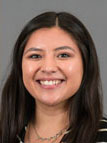
Magale is a Second Year Master of Public Health Student at UIC's School of Public Health within the Community Health Sciences Division. She served as a Public Health Fellow in the Illinois LEND Program from 2019-2020. She is currently the Research Assistant for this years Illinois cohort.
Image Description: The image shows Magale, a Latina woman, with medium dark hair. She is smiling and wearing a necklace with two chains. She is also wearing a black cardigan with thin horizontal stripes.
1. What does health equity mean to you?
I like to think of health equity as the distribution of resources that are allocated based on need. For example, COVID-19 has disproportionally impacted individuals with IDD therefore, resources should be specifically targeted for them. An example would be to increase testing and vaccines through IDD serving organizations that already have strong community ties and trust. It is also important to address the root of the problem.
2. How do you plan on promoting health equity within your community?
I have been working on improving access to care for refugee and immigrant children through the Illinois Chapter, American Academy of Pediatrics. I developed a toolkit for Illinois pediatricians to promote welcoming health care policies and connect this population of children with a medical home. An item in the toolkit is a template for pediatricians to write letters of support for children and youth with special health care needs who are immigrants or refugees. I have also been able to develop social stories through one of my advocacy assignments targeted specifically for individuals with IDD. The social story is about the COVID-19 vaccine to increase uptake in this population.
3. What are your professional and/or personal goals as an Emerging Leader within and outside the AUCD Network?
My professional goal is to develop a diverse network of relationships with individuals who are passionate about improving the health and quality of life for people with disabilities.
Ernesto Marquez Montes
Discipline: Psychology
Idaho Center on Disabilities and Human Development
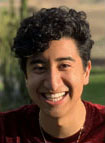
I am a fourth-year undergraduate student at the University of Idaho pursuing a BS in Psychology with minors in French and Art on a Pre-Medicine track. On top of my internship at the Center on Disabilities and Human Development, I peer mentor other college students on Autism Spectrum Disorder. I also have begun supporting another student in his launch of a non-profit dedicated to making American Sign Language resources more accessible in Idaho and its Hispanic population. I hope to become a medical pediatrician one day, but not before attaining a degree in genetic counseling.
Image Description: Ernesto has short curly black hair. He is wearing a red velvet textured shirt. He has dark brown eyes and is smiling in this photograph.
1. What does health equity mean to you?
To me, health equity means providing health services to those who are most underserved. Health in all aspects means quality health care access, quality food access, quality environment, and quality mental health services. One could go further into the definition of health because people are social beings. To live a quality life is to live a healthy life and vice versa. Often, those who need the health services most have the least access to them.
2. How do you plan on promoting health equity within your community?
I plan to promote health equity in my community simply by being me and leading by example. I encourage those around me to communicate about their emotions to fight mental health stigma. I encourage them to make healthy choices by making healthy choices myself. Anytime someone remarks on the self-discipline necessary to make a healthier choice, I invite them to do it with me. Be it drinking more water, talking about mental health, or exercising, I ask them to do it with me to make it less daunting.
3. What are your professional and/or personal goals as an Emerging Leader within and outside the AUCD Network?
My professional and personal goals both within and outside the AUCD network are almost the same; I want to help those who need it most. I cannot think of a more fulfilling feeling than that of easing someone else's burden. I always want to identify the root of the problem and do what I can to remediate it. Fixing the heart of the problem has the most significant impact.
Caitlin Crabb
Discipline: Disability Studies
Institute on Disability and Human Development (Illinois UCEDD)
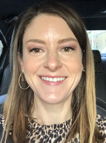
Caitlin is a visiting research specialist at Illinois’ UCEDD, the Institute on Disability and Human Development, housed within the University of Illinois at Chicago (UIC). Caitlin completed her PhD in Disability Studies at UIC in May 2020 and continues to work within the UCEDD on a variety of projects. Caitlin’s interests are access to home and community-based services and healthcare for adults with intellectual and developmental disabilities.
Image Description: Caitlin, a white woman with light brown hair, smiles into the camera. She wears purple eyeshadow and pink lipgloss. Caitlin is wearing hoop earrings, a nose stud, and a leopard-print dress.
1. What does health equity mean to you?
Health equity means equal opportunity for people from diverse backgrounds to achieve their peak health, both physically and mentally. Health equity is fostered through facilitators like high-quality healthcare, access to healthy foods, the provision of mental health services, and accessible information and education. In tandem, health equity can only be achieved through the reduction and elimination of barriers to accessing facilitators.
2. How do you plan on promoting health equity within your community?
I believe that information dissemination is an essential component of promoting health equity. Currently, I manage our UCEDD’s social media and e-mail listserv. I plan to continue promoting events that focus on health and healthcare through those platforms. I also plan on checking to ensure that information provided through those platforms is accessible using plain language, image descriptions, and other methods.
3. What are your professional and/or personal goals as an Emerging Leader within and outside the AUCD Network?
My professional goals as an Emerging Leader within the AUCD network prioritize the concepts of accessible dissemination, qualitative research, and advocacy. Our UCEDD has an initiative in which research articles are summarized and presented in plain language as “accessible research briefs” and I would like to be more involved in developing these documents. I wish to increase the qualitative research that I conduct, as I believe personal stories and experiences are one of those most powerful tools to incite change. This requires speaking with people with disabilities themselves about their stories and experiences and involving them in the research process. I also hope to continue increasing my advocacy skills, as I currently participate in an advocacy group that focuses on closing institutions and expanding community living in Illinois.
Timotheus Gordon Jr.
Discipline: Self-Advocacy, Disability and Human Development
Institute on Disability and Human Development (Illinois UCEDD)
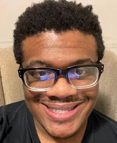
Timotheus “T.J.” Gordon Jr. is an African-American male autistic research associate in Chicago, IL. As a researcher at UIC’s Institute on Disability and Human Development, he creates trainings, webinars, guides, and campaigns on inclusion in communities of color, COVID-19 and the intersections of race and disability, autism in communities of color, and inclusion of people with disabilities in the U.S. Census. Gordon is one of the co-founders of Chicagoland Disabled People of Color Coalition, also known as Chicagoland DPOCC. Supported by the Institute on Disability and Human Development, Chicagoland DPOCC promotes disability acceptance and self-advocacy in communities of color throughout the Chicagoland area.
Image Description: A smiling young African-American adult male, with a black t-shirt, glasses, dark brown eyes, an Afro, and medium complexion
1. What does health equity mean to you?
Health equity is not only fighting for everyone to get access to adequate health care. In fact, health equity is the duty to address the barriers in getting adequate health care in marginalized communities, and the commitment to ensure that each person in the community will have the tools and options needed to access their health care needs in their community.
2. How do you plan on promoting health equity within your community?
I want to promote health equity in disability communities of color by creating and gathering accessible resources that many people can share and gain access to. By gathering those resources, people in those communities can learn more about options in health and how they can go to those resources within their community.
3. What are your professional and/or personal goals as an Emerging Leader within and outside the AUCD Network?
As an Emerging Leader, within and outside the AUCD network, I seek to use my advocacy, academic talents, creativity, and writing to encourage more autistic people of color to follow their dreams and passions in any endeavor they choose to explore, to get the resources needed to address co-morbidities of autism, push for inclusion of all aspects of life in their communities (e.g., education, arts, and entertainment, sports, culture, etc.), and feel comfortable with self-advocating and advocating for others to be proud of their intersectional identities (including race and disability).
Jessica Hinman
Discipline: Behavior Analysis
Illinois LEND
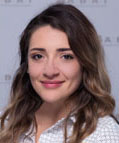
I am a board-certified behavior analyst who has been working with children, adolescents, and young adults with disabilities over the last six years. I am currently a doctoral student at UIC and the research coordinator at the Language, Cognition and Mindfulness Clinic which is part of UIC's IDHD Family Clinic. I am interested in providing resources and promoting services related to sexual health, identity, and interpersonal relationships to individuals with disabilities.
Image Description: A woman with a light complexion and long brown hair that is dark at the root and becomes a lighter brown at the ends. She is smiling at the camera and is wearing a white button down dress shirt with small black squares. She has on small silver earrings and a hoop nose ring.
1. What does health equity mean to you?
In my opinion, health equity involves community members having access to services and resources which promote well-being for all regardless of race, gender, disability, socioeconomic status, or nationality. Health equity should also involve aspects of well-being that go beyond the medical definition of health. I believe that health equity means providing resources to promote psychological, emotional, sexual, and environmental well-being for community members.
2. How do you plan on promoting health equity within your community?
I plan to promote health equity within the community by using behavior analysis to address health disparities on the individual and community levels through preventative education and outreach. I currently work as a behavior analyst and work with children, teens, and young adults with autism and other neurodevelopmental disabilities and plan to expand my work and advocacy efforts to include services to address oppressive practices to promote greater equity. My goal is to offer a more inclusive and critical behavior analytic approach that focuses on empowerment, self-determination, independence, and interdependence which celebrates neurodiversity within marginalized communities that are typically unable to access ABA services.
3. What are your professional and/or personal goals as an Emerging Leader within and outside the AUCD Network?
As an Emerging Leader, I hope to continue learning about and participating in advocacy and policy work to promote improved health equity among persons with autism and disabilities. I hope to continue improving access to ABA services for marginalized communities and to empower families. I also plan to pursue a career within academia to continue learning, teaching, and conducting research that promotes equity at the community level.
Sandra Vanegas
Discipline: Psychology
Illinois LEND
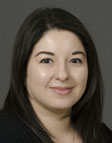
Sandra Vanegas, PhD is a bilingual (English/Spanish) developmental psychologist and is an Assistant Professor in the School of Social Work at Texas State University. Her research focuses on understanding and addressing disparities that impact racial/ethnically, linguistically and socioeconomically diverse children with disabilities and their families. Her objective is to create more equitable pathways for diagnostic and therapeutic services for children and families that have been typically underserved.
Image Description: A woman with a light complexion with dark brown hair smiling in front of a dark grey background.
1. What does health equity mean to you?
Health equity means advocating for systems change to create equitable opportunities for health and wellness. This means, that in addition to advocating for policy changes, you are also creating change at the local level by raising awareness and bridging systems of care with the community.
2. How do you plan on promoting health equity within your community?
I plan on promoting health equity by creating programs and networks with community organizations and individuals with disabilities and their families that are culturally responsive and that address the needs of the communities. This is accomplished by leveraging resources from research funding, community stakeholder input, and the university supports to increase access to services.
3. What are your professional and/or personal goals as an Emerging Leader within and outside the AUCD Network?
My personal and professional goal as an Emerging Leader is to put to practice my leadership skills by leading programs that will create sustainable change for children with disabilities and their families. This work requires interdisciplinary efforts from individuals of all sectors. I plan to expand my research program and service activities to create this change with others.
Katie Friedericks
Discipline: Family
Riley Child Development Center
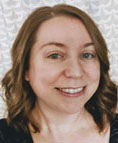
I am a Cincinnati native, Indiana University grad, and two-time AmeriCorps alum, who spent the last several years in Indianapolis with my firefighter husband and ten-year-old son. I earned a Masters in Library Science in 2009, but put my career on hold to stay home with my son. In 2020, after a few years as a part-time librarian and Health Information Specialist with Family Voices, IN, I became a full-time children’s librarian at Greenwood Public Library, moved to Greenwood, and started LEND as a Family Trainee.
Image Description: Image is of Katie Friedericks, a white woman with light brown hair and gray eyes who is smiling. She is wearing a navy dress and standing in front of a gray and white curtain.
1. What does health equity mean to you?
To me, health equity means that every individual and family has access to quality, affordable healthcare options. This could mean everything from affordable health insurance, a variety of local in-network providers, or ready access to fitness and recreation opportunities that improve quality of life.
2. How do you plan on promoting health equity within your community?
As a LEND Family Trainee who also happens to be a children's librarian within my community, my goal is to provide families equitable access to the library, as well as using library resources to improve access to the community outside of the library. I am currently developing a collection of sensory items such as weighted vests, fidgets, lap pads, etc. that our patrons will be able to utilize at the library as well as check out. Sensory tools can be expensive, and while some work well, I know from firsthand experience that some things are a better fit than others depending on the individual. I hope this collection will allow families the opportunity to try things out before buying, utilize items on a short-term basis, and provide access to otherwise unaffordable items. I also hope that these items can help increase the comfort level of our neurodiverse patrons within the library, and/or increase their comfort at home, school, and elsewhere in the community.
3. What are your professional and/or personal goals as an Emerging Leader within and outside the AUCD Network?
On a personal level, I hope to provide my young son with the same opportunities for education, recreation, and eventually employment as his neurotypical peers. Recognizing this desire within myself, as a children’s librarian I hope to promote acceptance and accommodations within our department so that all patrons feel welcome. I plan on expanding our sensory collection to include childhood experiences kits that will use real objects or toys, books, social stories, and/or videos to help prepare kids for things like doctor/dentist visits, haircuts, or airplane rides that can be especially difficult for those with sensory needs. Currently, my main professional duties are centered around collection development, and as such, I hope to maintain an up-to-date collection of disability resources for our patrons from pictures to parenting books.
Jessie Kiblen
Discipline: Social Work and Education
Center for Child Health and Development (Kansas UCEDD)
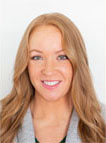
I am a licensed social worker and K-12 educator, currently amidst my doctoral program in Special Education at the University of Kansas. My research focuses on the promotion of self-determination for students with and without disabilities, specifically through the Self-Determined Learning Model of Instruction. I believe self-advocacy is an integral part of health and well-being and I plan to continue to contribute to the equitable access of opportunities and the removal of barriers for all people, including marginalized groups within local and national communities.
Image Description: Jessie, a white woman with long red hair, is against a gray wall. She wears a gray blazer with a green shirt underneath and smiles at the camera.
1. What does health equity mean to you?
I believe health equity is the right for all human beings to have equal access to all services and opportunities which promote their well-being. A person's well-being encompasses physical, mental, emotional, spiritual, vocational, and educational health. Health equity should incorporate access to services and opportunities and provide support for each person's differences, strengths, and right to make choices for themselves. My experience as a KUCDD trainee has allowed me to focus on my area of emphasis, self-determination, to promote enfranchisement for marginalized groups, and push back against ableist and racist structures that are barriers to health equity. I am a firm believer that our well-being is a barometer for how well our environment supports our ability to feel empowered in our own lives, and all human beings should be able to thrive in the environments in which they learn, work, and live.
2. How do you plan on promoting health equity within your community?
I plan to continue promoting awareness of all individuals' rights, including those that represent cultural and linguistic diversity in our communities. I will also continue to contribute to research that addresses systemic barriers and access to health equity in my local communities including in schools with a focus on promoting self-determination for all students. For example, on a KUCDD project I support, I can empower high school educators to enable their students with and without disabilities to set goals and navigate pathways in their own lives that contribute to their academic and social-emotional health. Lastly, I will be a strong advocate for each person's right to autonomy and will focus on elevating marginalized groups' voices and including self-advocates in community work and research in which I participate.
3. What are your professional and/or personal goals as an Emerging Leader within and outside the AUCD Network?
My professional goals as an Emerging Leader within and outside the AUCD network include participating in innovative research that promotes each person’s self-determination. I also wish to continue developing and solidifying relationships with local and national community partners that support and nurture equitable philosophies and improve educational practices. I want to model and share leadership qualities that bring together diverse groups and stakeholders to cultivate new ideas and opportunities that lead to health equity across all populations and settings. Lastly, I will continue to be a life-long learner, understanding that I will always be able to gain a new perspective, new knowledge, and new excitement from others that are different from myself. I share the passion with the Emerging Leaders community to serve, research, and educate to make positive changes with and for people with disabilities and their families.
Kiki Oyetunji
Discipline: Psychology
Center for Child Health and Development (Kansas LEND)
.jpg)
I am a second-year LEND fellow at the University of Kansas Medical Center and the 2020-21 Emerging Leaders, Events Intern. As a soon to be resident physician and an aspiring child psychiatrist, my interest and experience is in behavioral sciences. I am currently serving within the Kansas Department of Health and Environment (KDHE) Title V/Maternal and Child program as an intern working on a QI project in Children with Special Healthcare Needs. My focus is on better understanding social determinants and related factors that impact access to, redundancy in and fragmentation of care.
Image Description: Black woman with hair past shoulder length wearing a brown blazer and a light pink shirt underneath.
1. What does health equity mean to you?
Health equity to me, means a fair and equal right to the highest standard of healthcare. It means tailoring care to individuals while putting into consideration social determinants of health when providing services. It means providing a healthcare service that is devoid of both intentional and unintentional bias and discrimination when caring for people at every point in any care model.
2. How do you plan on promoting health equity within your community?
My efforts at promoting health equity within my community and State at large involves a Quality Improvement (QI) project targeting children with special healthcare needs (CSHCN). I am currently an intern within the Title V/Maternal and Child Health program looking to properly define a well-functioning system of care for children with special healthcare needs. The project aims to establish data sharing practices to enhance the systems of care (SOC) for CSHCN across health systems and develop a state level dataset regarding CSHCN population prevalence and need in Kansas. One recommendation made as an outcome of this project is the establishment of a tracking system for CSHCNs using quality measures that will be used in risk stratification while capturing Social Determinants of Health data. This system will contribute to a Kansas specific dataset and be maintained through consistency in procedures and protocols for sharing both patient-level and aggregate data between public and private health systems. With this population being a high-risk group, these efforts will promote access to healthcare, better coordination of care for families and service utilization without fragmentation of care.
3. What are your professional and/or personal goals as an Emerging Leader within and outside the AUCD Network?
My interest is in mental health disorders in children with neurodevelopmental disabilities. My professional goal would therefore be to manage Mental Health in this subset of patients as a child psychiatrist. My personal goal is to be the voice in my community for people with mental health disorders and be the change for destigmatization of mental health disorders.
Austin Nugent
Discipline: Public Administration
Human Development Institute (Kentucky UCEDD)
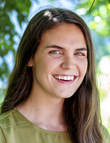
Austin is the Disability & Health Program Coordinator for the Human Development Institute (HDI) at the University of Kentucky. She holds her bachelor's in sociology and disability studies from the University of California, Los Angeles and is currently pursuing her Master of Public Administration and a graduate certificate in developmental disabilities. Over the last eleven years, she has held many roles in the community centered around supporting and advocating for the meaningful inclusion of people with disabilities. However, her favorite role is being the older sister to a biological brother with Down syndrome and two adopted brothers with various support needs resulting from adverse childhood experiences; it was through them, she learned to embrace her own support needs as a woman with multiple mental health diagnoses and chronic migraines.
Image Description: A woman with long, wavy brown hair stands outside in front of trees. She is wearing a green shirt and smiling at the camera.
1. What does health equity mean to you?
Health equity means the diverse, intersecting needs of individuals, and our communities are respected and supported. Like health, health equity is multidimensional. It requires all systems, not just healthcare, to provide individualized, person-centered care. Health equity is when information, schools, neighborhoods, and communities are fully inclusive and accessible to all.
2. How do you plan on promoting health equity within your community?
My role with HDI, and other community organizations, allow me to help build bridges between people, information, and opportunities that foster health equity and disability justice. In addition, my capstone and research project will focus on identifying equitable policies, systems, and environmental changes needed to address medical rationing and discrimination in healthcare. My specific interests are centered around health literacy and equitable access to mental health services and organ transplants.
3. What are your professional and/or personal goals as an Emerging Leader within and outside the AUCD Network?
Given my lived and family experience with disability, my professional and personal goals are identical. Knowing firsthand the value of information and opportunities, my mission is to support others to access resources and services that empower them to lead healthy, self-determined lives. Following graduate school, I am considering pursuing a law degree to gather additional knowledge needed to advocate and protect the rights of people with disabilities.
Winston Kennedy
Discipline: Physical Therapy/Kinesiology
Eunice Kennedy Shriver Center
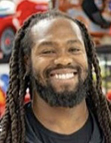
I am a licensed physical therapist and public health professional (graduated with MPH in Spring 2020). I am concurrently in the dissertation phase of a Ph.D. in Kinesiology with an emphasis in adapted physical activity at Oregon State University, as well as a LEND Fellow at the University of Massachusetts Medical School. My current research and advocacy efforts involve measuring and shifting healthcare professionals’ attitudes and behaviors as a way to promote better interactions between them and their clients with disabilities; as well as promoting adaptations to health professional curricula to include more disability-related content.
Image Description: A headshot of a black male with locs, smiling and looking handsome (well maybe looking handsome).
1. What does health equity mean to you?
Health equity means inclusion and access to all aspects of health for all people. It also means that supports and adaptions will be available to provide inclusive and accessible care when appropriate for those who need it.
2. How do you plan on promoting health equity within your community?
I plan on promoting health equity in my community by educating health systems and health professionals on how to better care for their clients. I have already begun doing so by creating continuing education modules for physical therapy professionals. I have also begun creating supplemental training materials for students in physical therapy training programs. In the future, I hope to collaborate cross professionally, with various health professions, so we are all aware of how we can work together to provide equitable health care to various populations.
3. What are your professional and/or personal goals as an Emerging Leader within and outside the AUCD Network?
My professional and personal goals as an emerging leader are to continue to spread awareness of the need for increased health equity. I also want to begin to shift to creating solutions to promote increased health equity. One solution is creating opportunities for laypeople to increase their health literacy, so they can begin.
Hibo Omer
Discipline: Public Health and Targeted Case Manager
Center for Community Inclusion and Disability Studies, University of Maine
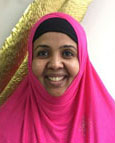 I am an ethio-SoMainer meaning I am an Ethiopian who is enculturated Somali who lived most of her life in Maine. I am a mother of four and who is an advocate for community members. I am a lifelong learner who is also a student now with AUCD. I work closely with families who have children with disabilities to get connected to the resources available.
I am an ethio-SoMainer meaning I am an Ethiopian who is enculturated Somali who lived most of her life in Maine. I am a mother of four and who is an advocate for community members. I am a lifelong learner who is also a student now with AUCD. I work closely with families who have children with disabilities to get connected to the resources available.
Image Description: A black woman is wearing a pink Hijab, a headscarf. She is standing next to a golden leaf in an office.
1. What does health equity mean to you?
It means that a person who gets sick getting back to their optimal level of health during recovery. For people of color, research and reality say otherwise. People of color trust providers and providers’ implicit bias cover their eyes from helping their patient to reach their optimal self after any sickness.
2. How do you plan on promoting health equity within your community?
Creating awareness of self-advocacy then those who can advocate for their family members and others. Being aware of the implicit bias of others so that for example if the medication is not working for them to ask for a different medication and advocate for themselves.
3. What are your professional and/or personal goals as an Emerging Leader within and outside the AUCD Network?
To create awareness about health equity and self-advocacy to mothers, fathers, and youth. To be aware of the systemic racism that exists and talk about it. Create awareness of the problems that exist in marginalized communities is not accidental but we need to talk about it and be involved with voting and politics locally.
Heather Eckner
Discipline: Family
Michigan LEND
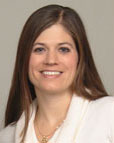 Heather is the parent of two children with neurodevelopmental disabilities. With a background in education, Heather has worked with students and families to navigate systems and services in securing evidence-based interventions that further access to educational opportunities. Heather's work now includes serving as the Statewide Director of Education Initiatives for the Autism Alliance of Michigan as well as in providing family development programming as an Instructional Assistant at Wayne State University. Heather's passion for advocacy is driven by a deep commitment to education and social justice.
Heather is the parent of two children with neurodevelopmental disabilities. With a background in education, Heather has worked with students and families to navigate systems and services in securing evidence-based interventions that further access to educational opportunities. Heather's work now includes serving as the Statewide Director of Education Initiatives for the Autism Alliance of Michigan as well as in providing family development programming as an Instructional Assistant at Wayne State University. Heather's passion for advocacy is driven by a deep commitment to education and social justice.
Image Description: Heather, a white woman with long brown hair is smiling at the camera. She wears a white sweater and a heart-shaped necklace.
1. What does health equity mean to you?
Health equity in my mind means that everyone has an opportunity to be as healthy as possible by removing systemic barriers to access to environmental and social determinants of well-being.
2. How do you plan on promoting health equity within your community?
Through a health equity lens, I am guided by the belief that every person should have the opportunity to achieve their full capabilities and potential. Identifying the differences in the distribution of opportunities and access that are systemic, patterned, unjust, and unnecessary frames the actions for my advocacy efforts aimed at the broader social processes underlying these inequities within my community.
3. What are your professional and/or personal goals as an Emerging Leader within and outside the AUCD Network?
My goals include driving advocacy initiatives that address barriers to access and opportunity in policy and systems of care for the PreK-12 population of students with disabilities. My hope is that in the years to come, I will be realizing my family priorities of seeing my own two children with neurodevelopmental disabilities potentially graduate from high school and college, while also working toward realizing my professional goals of reform within education that aligns with improved outcomes for students with disabilities. Ultimately, what drives my passion is whether I can serve in some capacity as a catalyst for long-term, meaningful change that improves the lives of individuals with disabilities and their families. This will bring me both personal and professional fulfillment.
Lily Slavin
Discipline: School Psychology
Michigan LEND
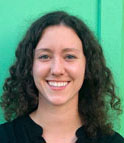
Lily is currently a doctoral candidate in the school psychology Ph.D. program at Central Michigan University and she is also pursuing her BCBA. Her research explores CHARGE syndrome, a rare genetic syndrome that can impact every sensory system and multiple bodily systems. Lily also has experience working with the state deafblind projects. Lily spent the 2020-2021 year as a Michigan LEND trainee.
Image Description: Lily is smiling in front of a light green and blue wall facing the camera. She has brown, shoulder-length curly hair and blue eyes. She is wearing a long-sleeved black shirt and a silver necklace.
1. What does health equity mean to you?
To me, health equity means ensuring that every person from every background has equitable access to quality healthcare that comprehensively meets their needs. To do this, professionals must be aware of the barriers and disproportionate outcomes existing for different populations, seek to understand the needs of these populations, and continuously and collaboratively work to address these needs both on an individual level and systems level.
2. How do you plan on promoting health equity within your community?
I plan to help promote health equity in my community by partnering with community members to learn about their needs, making changes related to my clinical work within my control to address these needs, and working towards systems-level change within my institution and larger community through advocacy. Partnering with community members is a crucial step in this process, as professionals cannot adequately address the needs of the people we are serving without first deeply understanding the perspective of our clients.
3. What are your professional and/or personal goals as an Emerging Leader within and outside the AUCD Network?
Within the next 3 years, I plan to be a licensed psychologist and board-certified behavior analyst working with children and adolescents with developmental disabilities in an academic medical center. I hope to remain involved with LEND and work towards becoming a LEND faculty member so I can train and mentor future leaders in the field. I would also like to become more experienced with advocacy, specifically advocating for policymakers.
Deqa A. Farah
Discipline: Registered Dietitian
Institute on Community Integration (Minnesota LEND)
 Deqa has been a registered dietitian in the Twin Cities for over 10 years. She focuses her work on teaching underprivileged communities the importance of good nutrition and healthy living. Deqa is the co-author of the book Somali Carbohydrate Counting Guide, an online tool to count the number of carbohydrates in traditional Somali foods. She is also the mother of two one of whom is wonderfully autistic.
Deqa has been a registered dietitian in the Twin Cities for over 10 years. She focuses her work on teaching underprivileged communities the importance of good nutrition and healthy living. Deqa is the co-author of the book Somali Carbohydrate Counting Guide, an online tool to count the number of carbohydrates in traditional Somali foods. She is also the mother of two one of whom is wonderfully autistic.
Image Description: Somali-American woman wearing an olive-colored hijab sitting on an outdoor staircase.
1. What does health equity mean to you?
Simply put, for me, health equity means that everyone regardless of their ability, social position, or circumstance has the chance to achieve full health potential.
2. How do you plan on promoting health equity within your community?
To achieve health equity, we must first address systemic racism in every facet of life. In the dietetics world, I am seeking to achieve organizational change in the Academy of Nutrition and Dietetics, the Accreditation Council for Education in Nutrition and Dietetics (ACEND), and the Commission on Dietetic Registration (CDR). I intentionally seek out spaces that promote diversity and inclusion in the dietetics world. By removing barriers to becoming nutrition professionals for disabled and abled-bodied Black, Indigenous, and People of Color (BIPOC). I will work with other change-makers in striving to highlight that many BIPOC are facing intersecting forms of marginalization and discrimination (LGBTQ, disabled, etc.) and seek to partner with those that are committed to uplifting these voices.
3. What are your professional and/or personal goals as an Emerging Leader within and outside the AUCD Network?
To fight systemic racism in the dietetics world.
Jacklyn Googins
Discipline: Occupational Therapy
Carolina Institute for Developmental Disabilities
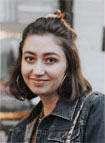 Jacklyn Googins is a second-year master's student studying occupational therapy, the founder/director of a 501(c)(3) non-profit, B3 Coffee, and the founder/director of the HEELS Bridge program. Jacklyn's work is dedicated to advancing a neurodiversity paradigm through community-based initiatives. She hopes to carve a non-traditional path as a future OT interested in inclusive workplace practices, neurodiversity in higher education, and post-secondary transition.
Jacklyn Googins is a second-year master's student studying occupational therapy, the founder/director of a 501(c)(3) non-profit, B3 Coffee, and the founder/director of the HEELS Bridge program. Jacklyn's work is dedicated to advancing a neurodiversity paradigm through community-based initiatives. She hopes to carve a non-traditional path as a future OT interested in inclusive workplace practices, neurodiversity in higher education, and post-secondary transition.
Image Description: Headshot of Jacklyn posing in front of a book store. She is smiling and wearing a jean jacket, gold hoop earrings, and a brown shirt.
1. What does health equity mean to you?
Health equity means all people of all identities and backgrounds have access to what they need to flourish. It means holding ourselves accountable "to nothing about us without us" and amplifying the voices of those with lived experience. It means learning from the expertise of and working in solidarity with, minoritized groups to collectively build capacities and dismantle barriers to social, civic, and community participation. It means seeking to understand people in the context of systems and structures that shape their experience and taking a critically reflexive, culturally sensitive approach.
2. How do you plan on promoting health equity within your community?
I plan on promoting health equity through expanding access to higher education through my work with the HEELS 2 Transition program. https://www.med.unc.edu/ahs/outreach/heels2transition/heels-bridge/ Additionally, I hope to continue building a platform of positive visibility and community connection for people of all abilities through my work with B3 Coffee. https://b3coffeestand.com/ Finally, I plan to continue to advocate for a paradigm shift within my profession toward a pro-neurodiversity, identity-affirming therapeutic approach. I co-founded a social media movement, OTs for Neurodiversity, that I plan to eventually transition to a consultative service for organizations, schools, employers, agencies, etc. interested in implementing Justice, Equity, Diversity, & Inclusion (JEDI) initiatives https://www.instagram.com/neurodiversity_ot/
3. What are your professional and/or personal goals as an Emerging Leader within and outside the AUCD Network?
My goals as an emerging leader include the following:
1. To listen/amplify the voices and perspectives of disabled people as a central philosophy of my practice
2. To identify & embark upon a non-traditional role as an OT in community-level, justice-oriented work.
3. To develop a strong macro-level understanding of the systems, structures, and policies that dictate healthcare to bend them toward justice
Emily Costello
Discipline: Family
Munroe-Meyer Institute for Genetics & Rehabilitation at the University of Nebraska Medical Center (Nebraska UCEDD)
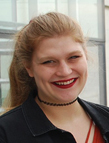 Emily Costello is a 2020-21 UCEDD Intern from Omaha, Nebraska, working with the Nebraska UCEDD at the Munroe Meyer Institute for Genetics and Rehabilitation. She is a family advocate and a sibling to a younger brother with Down Syndrome. Emily's internship has been spent focusing on Person- and Family-Centered Care and Planning, Care Coordination, and Diversity and Inclusion.
Emily Costello is a 2020-21 UCEDD Intern from Omaha, Nebraska, working with the Nebraska UCEDD at the Munroe Meyer Institute for Genetics and Rehabilitation. She is a family advocate and a sibling to a younger brother with Down Syndrome. Emily's internship has been spent focusing on Person- and Family-Centered Care and Planning, Care Coordination, and Diversity and Inclusion.
Image Description: A smiling white woman with blonde hair pulled into a ponytail. She wears an orange shirt with a black jacket and red lipstick.
1. What does health equity mean to you?
Health Equity means that everyone, regardless of ability, race, religion, economic status, gender, or any other element of identity, is entitled to equal opportunities to receive the best health outcomes, costs, and experiences.
2. How do you plan on promoting health equity within your community?
I have plans to continue work to improve care coordination efforts in my state and improve access to mental and behavioral healthcare for CYSHN so that families and individuals feel supported and guided as they navigate complicated health systems, mental and behavioral health challenges, and the general stress of life.
3. What are your professional and/or personal goals as an Emerging Leader within and outside the AUCD Network?
Professionally, I am passionate about centering the lived experience of individuals with disabilities and their families and encouraging education, outreach, and cultural humility in all disability advocates. Personally, my goals are to support and advocate for my sibling with a disability in any way he needs and to encourage his self-advocacy.
Melanie Davis
Discipline: Self-Advocacy
Munroe-Meyer Institute for Genetics & Rehabilitation at the University of Nebraska Medical Center (Nebraska UCEDD)
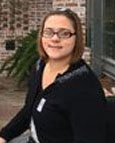 I am a 35 year that identifies as a person with a disability. I have faced many barriers and areas in my life in which there is no legislative precedent for how to deal with a particular issue. It has been because of this that I have dedicated a great deal of my life to highlighting the areas in which need improvement to give everyone an equal life.
I am a 35 year that identifies as a person with a disability. I have faced many barriers and areas in my life in which there is no legislative precedent for how to deal with a particular issue. It has been because of this that I have dedicated a great deal of my life to highlighting the areas in which need improvement to give everyone an equal life.
Image Description: Indoors in front of a garden archway. Chin length brown hair, glasses, black sweater with beadwork on the shoulders. Grey and white pants. Seated in a wheelchair.
1. What does health equity mean to you?
Health equity is being on an even playing field with the non-disabled population. Even doesn't always mean it is an effective treatment for a healthcare issue, but if on the same playing field the chance to have a healthy lifestyle is more plausible.
2. How do you plan on promoting health equity within your community?
Health equity for me means that looking at durable medical equipment access must take a front seat in the world of policy. As a person with a disability, I have experienced a long-standing oversight of the barriers people experience in attaining much-needed equipment. I plan to continue to tell my personal story as it relates to this issue with data to back up the issue that are present. This story needs to be in front of various stakeholders to effect change and consequently giving people with disabilities an equitable life.
3. What are your professional and/or personal goals as an Emerging Leader within and outside the AUCD Network?
As a person with a disability, I hope to attain competitive long-term employment in the field of disability policy. I would like access to continuing education in a format that I can gain knowledge, so the AUCD network is greatly beneficial to me because of the format in which education can be received.
Maria Sieper
Discipline: Family
NH-ME LEND
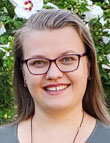 My name is Maria Sieper. I am a parent of an 8-year-old child with a developmental disability and an advocate. I am actively involved in the local community organizations that provide services, family support, and education to people with disabilities and their families. I am a 2019 NH Leadership Series Graduate and a 2020 LEND Graduate.
My name is Maria Sieper. I am a parent of an 8-year-old child with a developmental disability and an advocate. I am actively involved in the local community organizations that provide services, family support, and education to people with disabilities and their families. I am a 2019 NH Leadership Series Graduate and a 2020 LEND Graduate.
Image Description: A white woman with long brown hair is outside on a bright day in front of the green bush with white flowers. She wears glasses and smiles at the camera. She also wears a military-green dress, earrings, and a necklace.
1. What does health equity mean to you?
Health equity is fair access to the means (economic and social determinants) for people to be healthy physically and mentally. This means removing obstacles to health such as social injustice, discrimination, lack of access to jobs with fair pay, quality education and housing, safe environments, and health care.
2. How do you plan on promoting health equity within your community?
I am working within my community to promote health equity for people with disabilities through my advocacy, research, and education.
3. What are your professional and/or personal goals as an Emerging Leader within and outside the AUCD Network?
My ultimate goal is to implement the leadership skills I’ve gained through NH-ME LEND training in the line of work with families who have children with disabilities. I want to help organize and educate my community for people with disabilities to live their lives to the best of their abilities, full of inclusion and equality.
Grace Stott
Discipline: Nutrition
NH-ME LEND
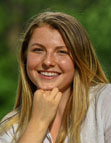
Email Address: [email protected]
Image Description: : Grace, a white woman with long dirty blond hair, is outside on a bright day surrounded by trees and is smiling at the camera. She is wearing a short-sleeved white blouse and leaning on a picnic table with her arm propped under her chin.
1. What does health equity mean to you?
To me, health equity means the ability for every person to reach their full health potential, regardless of their race, ethnicity, ability, gender, class, background, or circumstance. Health equity is multifaceted and includes equitable access to health care services, nourishing food, a safe living environment, and the opportunity to live an active and healthy life across all aspects.
2. How do you plan on promoting health equity within your community?
I have always had the intention to work for an organization that promotes health equity and using my nutrition expertise, my dream would be to start a nutrition or food access initiative in my community to reduce health disparities. I hope to collaborate with the multi-disciplinary members of my community to provide the best services and resources possible, forming positive and productive partnerships that better the community. Change comes best when many people work together and I would advocate for health equity to my local government officials who can help with larger scale outreach or program development. By not being afraid to have difficult conversations and raising awareness, I hope to be a changemaker in not only my community but beyond.
3. What are your professional and/or personal goals as an Emerging Leader within and outside the AUCD Network?
Health equity in all aspects, with a specific focus on food justice. I want to work on a larger scale and make positive differences that affect many. I am currently an active member of my profession's governing body and will continue to do so. Regardless if I end up working in the field of disability or not, I will come into contact with a disability, so I hope to be a leader in the nutritional care for those with disabilities and serve as a liaison for the community. I intend to advocate for individuals who experience disabilities who face numerous equity challenges daily. By being a knowledgeable and compassionate leader I can lead the next cohort of future nutrition professionals and empower the field to the best of my ability.
Luticha A. Doucette
Discipline: Self-Advocacy
Strong Center for Developmental Disabilities, University of Rochester
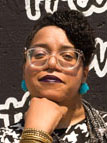 Advocate, agitator, coach, entrepreneur, cat mom, human.
Advocate, agitator, coach, entrepreneur, cat mom, human.
Image Description: Picture of a honey-skinned person sitting in a hot pink and black wheelchair with their hair braided into a swoop across their forehead. They are wearing a black and white houndstooth long sleeve shirt with fire hot pink pants, large clear glasses, aqua-colored earrings that look like rock candy, and a silver multistrand necklace. Their right arm is covered in gold bangles. They are looking fiercely into the camera with their head resting on their right fist. In the background is a purple mural with the word freedom written.
1. What does health equity mean to you?
Everyone receives and has access to the care they need.
2. How do you plan on promoting health equity within your community?
Currently, I am helping to organize folk to comment on the HCBS draft and have gathered folk from my local union to ensure disabled And PCA who are Black and brown have the ability to comment on the draft. Additionally, I am working with NYS reps to make getting on the Medicaid Buy-in Program easier so more disabled New Yorkers can have access to health care.
3. What are your professional and/or personal goals as an Emerging Leader within and outside the AUCD Network?
I want to continue growing my business coaching those leading equity initiatives rooted in disability justice principles.
Sandra Duarte
Discipline: Occupational Therapy
Westchester Institute for Human Development
 Sandra M. Duarte MS, OTR/L, RYT-200 has been working as a school-based occupational therapist with the NYC Department of Education (DOE) since 2013. She completed a 9-month interdisciplinary training with the Leadership in Neurodevelopmental and Related Disabilities (LEND) program at the Westchester Institute for Human Development in Valhalla, NY in 2012. Sandra obtained an MS in Occupational Therapy at Mercy College in 2013. Currently, She is pursuing an OTD at NYU with areas of expertise in cultural responsiveness and international practice. Sandra is very passionate about giving back to the community. She has been a volunteer with Medical Mission Ecuador (MME) since 201, she has mentored occupational therapy students through COTAD since 2019, and she is founding Missions for Love Beyond Borders (MFLBB) that aims to provide telehealth parent coaching interventions using culturally responsive and strength-based practices.
Sandra M. Duarte MS, OTR/L, RYT-200 has been working as a school-based occupational therapist with the NYC Department of Education (DOE) since 2013. She completed a 9-month interdisciplinary training with the Leadership in Neurodevelopmental and Related Disabilities (LEND) program at the Westchester Institute for Human Development in Valhalla, NY in 2012. Sandra obtained an MS in Occupational Therapy at Mercy College in 2013. Currently, She is pursuing an OTD at NYU with areas of expertise in cultural responsiveness and international practice. Sandra is very passionate about giving back to the community. She has been a volunteer with Medical Mission Ecuador (MME) since 201, she has mentored occupational therapy students through COTAD since 2019, and she is founding Missions for Love Beyond Borders (MFLBB) that aims to provide telehealth parent coaching interventions using culturally responsive and strength-based practices.
Image Description: Sandra, a Latina woman with short dark hair, is enjoying a Sunny day during a Florida trip. She wears a white blouse, a green and gold necklace, and a pair of large gold loop earrings while smiling at the camera.
1. What does health equity mean to you?
Making sure that everyone has the same opportunity to obtain fair access to health care services to be as healthy as possible.
2. How do you plan on promoting health equity within your community?
I have been a volunteer with the Medical Mission Ecuador (MME) since 2013. Once a year, I have been traveling to Ambato, Ecuador to provide free therapeutic services to children alongside professionals from a variety of healthcare disciplines. Additionally, for over a year I have been working in creating a non-profit organization "Missions for Love Beyond Borders" which aims to provide telehealth coaching interventions to caregivers of individuals with disabilities who often do not have access to therapeutic services. While we wait to get incorporated this year, occupational therapy students from a local university are doing some research to help with the creation of a library of instructional modules to teach strategies to caregivers that will help in promoting the independence of loved ones while improving the caregiver's self-efficacy.
3. What are your professional and/or personal goals as an Emerging Leader within and outside the AUCD Network?
Goal 1: Currently I am enrolled in an occupational therapy doctorate (OTD) at New York University and I am expected to graduate this fall.
Goal 2: To complete a draft of a teletherapy coaching protocol by fall.
Goal 3: To complete the incorporation and non-profit status process for "Missions for love Beyond Borders" this year and serve as the Executive Director in a volunteering capacity
Goal 4: To take courses that will assist me in performing my role and duties within the non-profit organization and continue strengthening it and expand the telehealth coaching model to other countries in which service delivery is limited.
Sue Ram
Discipline: Occupational Therapy
LEND Program at Cincinnati Children's Hospital and the University of Cincinnati
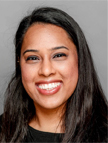 I am an occupational therapist at Cincinnati Children’s Hospital Medical Center, and I earned my doctorate in occupational therapy at Gannon University. I have a passion for leadership, research, and advocacy. I am always looking to advance my professional journey through didactic and hands-on experiences. As a LEND trainee, my hope is to further develop my clinical skills and reasoning to continue learning ways to provide culturally competent and evidence-based intervention to children, youth, and their families.
I am an occupational therapist at Cincinnati Children’s Hospital Medical Center, and I earned my doctorate in occupational therapy at Gannon University. I have a passion for leadership, research, and advocacy. I am always looking to advance my professional journey through didactic and hands-on experiences. As a LEND trainee, my hope is to further develop my clinical skills and reasoning to continue learning ways to provide culturally competent and evidence-based intervention to children, youth, and their families.
Image Description: An image of Sue Ram has black hair wears a black top while smiliing at the camera.
1. What does health equity mean to you?
Health equity means access to healthcare for all regardless of who you are and where you come from. Health equity means making an effort to not only understand barriers that under-represented groups face but the action of eliminating those barriers in a way that promotes access to all.
2. How do you plan on promoting health equity within your community?
I plan on promoting health equity through continued efforts to advocate for equitable care for all; especially those with disabilities. I will continue to use my voice and platform in the occupational therapy community to do so. I will also continue my efforts to advocate on a personal, local, and national level through interacting on a regular basis with my members of congress. In addition, I will support individuals and legislation that have the best interest of all. I will also take on volunteer leadership roles in organizations that strive to make healthcare accessible for every individual.
3. What are your professional and/or personal goals as an Emerging Leader within and outside the AUCD Network?
My professional goals include taking on national leadership roles in order to use my voice and take action to help others. I hope to further my education and participate in research initiatives that will support health equity.
Teresa Smith
Discipline: Psychology
LEND Program at Cincinnati Children's Hospital and the University of Cincinnati
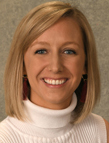 Currently, I am a psychology postdoctoral fellow at Cincinnati Children's Hospital. I am passionate about clinical work and research aimed at increasing health equity, especially related to mental health, among children with developmental disabilities and their families.
Currently, I am a psychology postdoctoral fellow at Cincinnati Children's Hospital. I am passionate about clinical work and research aimed at increasing health equity, especially related to mental health, among children with developmental disabilities and their families.
Image Description: Teresa, a white woman with medium-length blonde hair, has taken a professional headshot. She wears a white, sleeveless turtleneck sweater and smiles at the camera.
1. What does health equity mean to you?
The opportunity for everyone to live the healthiest life possible, no matter who they are, where they live, or how much money they make.
2. How do you plan on promoting health equity within your community?
From a psychology perspective, I often focus on the bi-directional relation between the mind and body. My focus is to improve wellbeing and mental health for all in order to increase overall health. On a systematic level, one way I plan to do this is to increase access and inclusion in community settings so that individuals with developmental disabilities and their families can engage in the community in meaningful ways and thereby increase wellbeing. On an individual level, I plan to continue to promote health equity through culturally-based psychological assessments and interventions.
3. What are your professional and/or personal goals as an Emerging Leader within and outside the AUCD Network?
My goals include establishing my role as a leader within my LEND and AUCD network by leading didactics, sharing my current work on health equity locally and nationally, and facilitating important dialogue about health equity. I would like to learn more from the AUCD network related to national policies and initiatives to increase health equity.
Jessica Huddleston
Discipline: Audiology
Oklahoma LEND
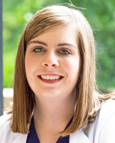 Jessica Huddleston is the Emerging Leaders, Communications, and Engagement Intern for 2020-2021 and an advanced LEND fellow at the OK LEND. She is currently working on her Doctorate of Audiology at The University of Oklahoma Health Sciences Center. Jessica is a LEND fellow from the OKLEND program and is currently beginning her role as an advanced LEND trainee. Her passion includes working with individuals who have neurodevelopmental disabilities and their families. She enjoys learning more about educational policy and advocacy so that she can empower self-advocates to advocate for themselves. As a person with hearing loss, Jessica enjoys working with families that have just received a diagnosis of hearing loss and are figuring out a path forward to success. Jessica hopes to work as a pediatric audiologist and serve on an interdisciplinary team.
Jessica Huddleston is the Emerging Leaders, Communications, and Engagement Intern for 2020-2021 and an advanced LEND fellow at the OK LEND. She is currently working on her Doctorate of Audiology at The University of Oklahoma Health Sciences Center. Jessica is a LEND fellow from the OKLEND program and is currently beginning her role as an advanced LEND trainee. Her passion includes working with individuals who have neurodevelopmental disabilities and their families. She enjoys learning more about educational policy and advocacy so that she can empower self-advocates to advocate for themselves. As a person with hearing loss, Jessica enjoys working with families that have just received a diagnosis of hearing loss and are figuring out a path forward to success. Jessica hopes to work as a pediatric audiologist and serve on an interdisciplinary team.
Image Description: Woman with blonde shoulder length hair sitting outside wearing a white coat over a blue blouse.
1. What does health equity mean to you?
Health equity means that everyone has an opportunity to access healthcare when they need or want to regardless of a patient’s gender, race, age, or disability. Equity includes all individuals being able to be a full member of their health care team. As a future health care provider and a self-advocate, I hope to be a constant reminder to my peers that individuals with disabilities can and should be included in the research, policymaking, and implementation. This will begin the process of limiting or removing any barriers that make accessing health care more difficult for certain groups.
2. How do you plan on promoting health equity within your community?
I plan on advocating for individuals who are Deaf/Hard of Hearing to be included in all areas of healthcare. Deaf and Hard of Hearing individuals tend to be viewed as having less self-efficacy or requiring more assistance because of their need for an interpreter. However, self-advocates and their family are the most valuable resource for policymaking because of their meaningful lived experiences. I plan on continuing research that investigates the knowledge and experiences of health care providers and educators in providing care/instruction for people with hearing loss.
3. What are your professional and/or personal goals as an Emerging Leader within and outside the AUCD Network?
As a professional, I hope to serve as a pediatric audiologist in a public health environment. I hope to conduct research that includes family members and self-advocates on the research team to better assess the current situation and determine what needs should be addressed first to ensure health equity is being advanced for all individuals, regardless of their background.
Emily Isbill
Discipline: Law, Health Administration
Oklahoma LEND
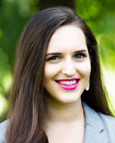
I am an Oklahoman, born and raised, graduating with both my Juris Doctor and Master of Health Administration in May 2021 from the University of Oklahoma. I will be working in a Medical-Legal Partnership at a local health care facility through Legal Aid Services of Oklahoma after graduating. I live with my husband and two cats in Oklahoma City and previously worked in marketing before returning to school. My interests outside of work and school include volleyball, reading historical non-fiction, cooking, watching movies on Netflix, volunteering with local organizations, and spending time outdoors.
Image Description: Emily, a white woman with long brown hair and blue eyes, is outside on a warm spring day. The trees behind her are out of focus. She is smiling and has bright pink lipstick on. She is wearing a royal blue shirt with a gray blazer on top.
1. What does health equity mean to you?
Health equity means that all persons have equal access to health care and all the factors that play a role in an individual's health. This includes access to fresh produce, walkable spaces, clean water, affordable housing, and transportation. Health equity is ensuring that all people can have healthy lives, and actively working to fix injustices that have led to health disparities. Health equity means looking at systems to see where improvements can be made instead of placing the impetus on "individual responsibility."
2. How do you plan on promoting health equity within your community?
In my future role as an attorney at a Medical-Legal Partnership, I will be legally addressing health inequities by assisting patients with any legal needs that negatively impact health. This can include housing, Social Security and Disability benefits, Medicare or Medicaid assistance, appealing insurance denials, and many more issues. I also hope to be a professional resource for health care providers that want to address legal and policy issues that negatively impact patient health.
3. What are your professional and/or personal goals as an Emerging Leader within and outside the AUCD Network?
My professional goals are to aid low-income and historically disadvantaged communities through my future job as an attorney with Legal Aid Services of Oklahoma. I hope to become involved in policy at the state level by advocating for legislation that will positively impact communities that have seen health disparities - including minority and disability communities. As a member of the AUCD network, I plan to draw on my education and the connections that I've made to achieve these goals.
Wendy Spoon
Discipline: Family
Oklahoma LEND
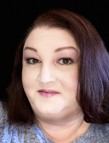 Wendy Spoon is a family advocate and mentor in Oklahoma. She is a Partners in Policymaking graduate and a LEND Fellow. When she is not chauffeuring her 21-year-old self-advocate daughter, she enjoys reading books and taking day trips with her husband.
Wendy Spoon is a family advocate and mentor in Oklahoma. She is a Partners in Policymaking graduate and a LEND Fellow. When she is not chauffeuring her 21-year-old self-advocate daughter, she enjoys reading books and taking day trips with her husband.
Image Description: Wendy has shoulder-length brown hair. She is smiling at the camera. Behind her is a black background. She is wearing a variegated blue top with a silver chain.
1. What does health equity mean to you?
Health equity means access to healthcare for everyone. We must identify and removes gaps in care, make bridges to access, and be fully committed to serving each individual.
2. How do you plan on promoting health equity within your community?
To promote health equity in my community, I will be mindful of the consequences a lack of equity means to individuals around me. I will ensure that legislators in my area stay informed of health equity gaps and are aware of the lived experiences of those with disabilities and other underserved communities. Legislation for health equity can help address health care disparities to provide equal access to healthcare for all. Making sure that families are aware of resources in their area is necessary.
3. What are your professional and/or personal goals as an Emerging Leader within and outside the AUCD Network?
My goal as a LEND Fellow and an Emerging Leader is to align with other families in my area. To continue to mentor families who may be having difficulties with education, healthcare, or just need to share lived experiences with someone who has been there. I will continue to keep politicians informed of the impact of legislation on the disability community. I want to keep individuals with disabilities and their families included in the conversation and that they are receiving person-centered services and have the opportunity to live their best life.
Grace Fay Cooper
Discipline: Anthropology
The Institute on Disabilities at Temple University
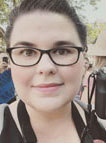 I began my educational journey in the mid-’90s in Roy, WA a town of roughly 500 people and I am now completing a Ph.D. at Temple University in a major city with a population of approximately 1.5 million people. In life, I am most grateful for my family and their continued championing of my dreams. As the first person in my family to go to college, it is my absolute resolve to not only return the favor to each family member individually but to use my educationally accrued social capital to preserve and promote the humanity of those who dream beyond the confines of their social position. I am currently living just outside of Philadelphia with my husband and our dog Camila.
I began my educational journey in the mid-’90s in Roy, WA a town of roughly 500 people and I am now completing a Ph.D. at Temple University in a major city with a population of approximately 1.5 million people. In life, I am most grateful for my family and their continued championing of my dreams. As the first person in my family to go to college, it is my absolute resolve to not only return the favor to each family member individually but to use my educationally accrued social capital to preserve and promote the humanity of those who dream beyond the confines of their social position. I am currently living just outside of Philadelphia with my husband and our dog Camila.
Image Description: In this image, I am wearing black-rimmed glasses. I am holding a camera. I have pale skin, brown eyes, and brown hair that is tied back.
1. What does health equity mean to you?
To me, health equity means that each person within our system of health care receives treatment or delivers medical attention in a way that not only takes into consideration their individuality but honors their humanity. Health equity requires that both patients and medical professionals exist within a system that fosters shared respect and understanding while simultaneously removing social hierarchies founded on ableism and other exclusionary ideologies. Health equity is not a goal to be accomplished or a task to be completed. Health equity is a commitment that we must make to each other. A commitment we must make as humans who all live with the physical limitations of our human body but also have the collective capacity to abolish any and all of the social limitations we place on ourselves.
2. How do you plan on promoting health equity within your community?
I am a member of many different communities both professionally and personally, therefore I plan to promote health equity across these different communities by first continuing to listen and learn from members and second by building relationships across groups that may not immediately recognize their mutual connection. For example, I have long been allied with the Latinx immigrant community and from my experience members can be hesitant to seek health, social, and disability services for various reasons while at the same time leaders in the disability community continue to advocate for inclusion of individuals from immigrant communities. I plan to continue following the lead of community members, finding points of common ground, and bringing members into communication with one and other. When community members recognize their mutual connections they can form networks of care that increase health equity and overall social strength.
3. What are your professional and/or personal goals as an Emerging Leader within and outside the AUCD Network?
Personally, as the sister of my brother with autism I strive to bring resources to my family so that we all can continue to grow in our knowledge of and advocacy for the civil and human rights of individuals with disabilities. This personal goal aligns with my professional ambition to deepen my involvement with nationwide campaigns, initiatives, and communities within and beyond the AUCD network. I am most interested in utilizing my skills as a community organizer and ethnographic researcher to build coalitions among stakeholders from across the AUCD network and to facilitate solidarity with groups from outside of the traditionally understood boundaries of the disability community.
Jessica Stevens
Discipline: Occupational Therapy
Boling Center on Developmental Disabilities at UTHSC
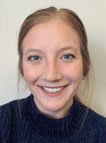 I have spent my academic career serving others through my studies and work. After being raised in Memphis, TN, I moved to the Midwest of Illinois and Iowa, which allowed me to experience people with different backgrounds, lifestyles, and life outlooks. I will graduate with my Doctorate in Occupational Therapy as a first-generation student and hope to work with people throughought the lifespan who have disabilities or neurological conditions such as strokes, traumatic brain injuries or multiple sclerosis.
I have spent my academic career serving others through my studies and work. After being raised in Memphis, TN, I moved to the Midwest of Illinois and Iowa, which allowed me to experience people with different backgrounds, lifestyles, and life outlooks. I will graduate with my Doctorate in Occupational Therapy as a first-generation student and hope to work with people throughought the lifespan who have disabilities or neurological conditions such as strokes, traumatic brain injuries or multiple sclerosis.
Image Description: JC headshot - necklace, blazer, purple
1. What does health equity mean to you?
Health equity to me means providing the needed services and support for any individual to be able to participate in their activities of daily living. The Covid-19 pandemic was one example of the health disparities that are present in our nation, as well as other nations, that cause detrimental effects on people's health, well-being, and participation in their meaningful occupations. Health equity is a form of social justice and beneficence for all individuals and must be promoted amongst all communities.
2. How do you plan on promoting health equity within your community?
As a future occupational therapy practitioner, I plan on advocating for my clients, their families, and the community so that they may be provided with the needed healthcare services to prevent health disparities amongst them. It is my goal and mission to listen, act, and advocate for members of my community by completing a needs assessment of my community to identify the present gaps and provide solutions to bridge these gaps.
3. What are your professional and/or personal goals as an Emerging Leader within and outside the AUCD Network?
I plan to take the skills and knowledge I have learned from the AUCD network to my urban town of Iowa to promote health equity. I will complete this by applying my focused research on interdisciplinary care to bridge the gap of team-based care and its effect on patient care.
Jennifer Crawford
Discipline: Special Education & Advocacy
LoneStar LEND at University of Texas Health Science Center at Houston
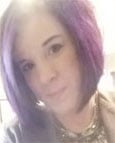
Jennifer Crawford, MS. Ed, owned and founded The Learning Lane a center for children with autism using ABA Principles. Jennifer believes by using the principles of Applied Behavior Analysis, positive and meaningful learning can take place. Jennifer is a Passionate Advocate for Children with Autism in the Educational Setting.
Email Address: [email protected]
Image Description: JC headshot - necklace, blazer, purple
1. What does health equity mean to you?
Health equity simply means to me that EVERYONE has access to the Health Amenities that one desires/needs to help promote a life of social balance and community involvement.
2. How do you plan on promoting health equity within your community?
One way that I plan to promote health equity in my community is by becoming a Child Care Health Consultant, (CCHC). In this role, I can work with children, parents, and child care providers to begin to educate them on Health Equity in the Early childhood setting.
3. What are your professional and/or personal goals as an Emerging Leader within and outside the AUCD Network?
My personal goal as an Emerging Leader outside the AUCD network is to write a children's book. My professional goal as an Emerging Leader within the AUCD network is to continue to learn and collaborate with other professionals for the best interest of the community.
Tatum Gross
Discipline: Family
Vanderbilt Consortium LEND
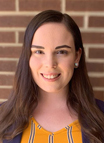 My sister Asher has multiple disabilities, and I hope to advocate for her and other children who face similar barriers and obstacles. I am a pre-med student at East Tennessee State University majoring in Health Sciences. I am a ballet teacher for 4–8-year-olds and high school-aged kids, and a long-term LEND trainee at Vanderbilt Consortium LEND.
My sister Asher has multiple disabilities, and I hope to advocate for her and other children who face similar barriers and obstacles. I am a pre-med student at East Tennessee State University majoring in Health Sciences. I am a ballet teacher for 4–8-year-olds and high school-aged kids, and a long-term LEND trainee at Vanderbilt Consortium LEND.
Image Description: Tatum, a girl with dark hair and brown eyes looks into the camera and smiles. She is standing in front of a brown brick wall and is wearing a navy blue blazer jacket over a yellow shirt with navy blue and white vertical stripes and white diamond stud earrings.
1. What does health equity mean to you?
Health equity means that not only does every patient have the same quality of treatment, but also that every patient has equal access and opportunity for health care in the first place. Medical professionals must be aware of and eliminate their biases.
2. How do you plan on promoting health equity within your community?
I will politely educate anyone I can about any boundaries to health equity in our community. I will also advocate for policy/legislation changes that will promote health equity and share my family's personal story for the good of these policies.
3. What are your professional and/or personal goals as an Emerging Leader within and outside the AUCD Network?
I am a family member of a child with multiple disabilities, so I hope to learn as much as possible to advocate for her. Professionally, I am a pre-med student and hope to become a physician.
Adrienne Seamans
Discipline: Special Education
URLEND/CDHD
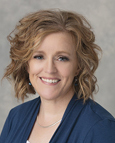 I am in the Ph. D. program at the University of Idaho studying Special Education. I am a governor-appointed parent member of the Idaho Council on Developmental Disabilities. I am working towards my BCBA credential. I am the mother of two children diagnosed with autism.
I am in the Ph. D. program at the University of Idaho studying Special Education. I am a governor-appointed parent member of the Idaho Council on Developmental Disabilities. I am working towards my BCBA credential. I am the mother of two children diagnosed with autism.
Image Description: Redhead female wearing a blue and white shirt.
1. What does health equity mean to you?
Health equity means to me that all individuals can have equal opportunities for health care no matter their race, disability, or income.
2. How do you plan on promoting health equity within your community?
As a leader in the special education field, I plan on promoting health equity by ensuring that all students that I work with have equal opportunity to work towards being as independent as possible by providing interventions and skills training to aid in their success, no matter their health needs.
3. What are your professional and/or personal goals as an Emerging Leader within and outside the AUCD Network?
My professional goal is to help get a BACB-approved course sequence within a university in the state of Idaho so that we may get more BCBAs in our state to help provide services. Along with that goal, I hope to help create an autism clinic that provides evidence-based services to individuals with developmental delays, but also provide an approved, certified field placement to help those wanting to get their BCBA.
Laura Cranfill
Discipline: Advocacy and Rehabilitation Counseling
Partnership for People with Disabilities at Virginia Commonwealth University (VCU)
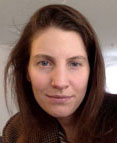 I am a highly adaptable person that is highly skilled in technical know-how. Tutoring or teaching is always an adventure, and I would want to bring that knowledge to future employers in order to change the world for people with disabilities (PWD) pre-and post-graduation. It is important to start early and remain steadfast toward goals no matter what.
I am a highly adaptable person that is highly skilled in technical know-how. Tutoring or teaching is always an adventure, and I would want to bring that knowledge to future employers in order to change the world for people with disabilities (PWD) pre-and post-graduation. It is important to start early and remain steadfast toward goals no matter what.
Image Description: Woman with medium-length brunette hair and blue eyes wearing a brown/black houndstooth business jacket.
1. What does health equity mean to you?
Health equity means access to healthcare no matter what a person's income. In other words, my goal is to de-link gainful employment and insurance. That is why I want to specialize in employment counseling or consulting to guide PWDs to gainful employment by educating employers of the limitless possibilities that PWD can and do bring to the workplace. By de-linking healthcare from employment, it is one less stressor that PWD have to worry about and this policy change can take that extra energy and refocus it towards a job.
2. How do you plan on promoting health equity within your community?
By de-linking health care coverage and employment, it would encourage more PwD to take better care of themselves because it removes the concern over paying co-pays or buying healthcare through the marketplace. Removing all the loopholes herein buying health insurance in the marketplace would equalize everyone as far as equity in access. By removing the association between income, benefits, and access to health insurance, I hope to promote health equity by supporting policies that encourage time off from work for health reasons and to have some way of guaranteeing health insurance while remaining gainfully employed. I believe there are unintended consequences of PwD being overly reliant on benefits because by disappearing from the fabric of society due to lack of income or insurance, it gives the impression that the only way PwD contribute to society is only through their health insurance and related peripherals to people who stand to profit off this pre-determined destiny of PwD. Also, I believe that Durable Medical Equipment, such as motorized wheelchairs, should not be restricted to in-home use only. Motorized wheelchairs enable PwD to travel and educate themselves through interactions with other people in society. Education is not strictly school-based. It also includes real-life experiences not duplicated in textbooks or through virtual classrooms.
3. What are your professional and/or personal goals as an Emerging Leader within and outside the AUCD Network?
I hope to educate employers about the benefits of hiring PWD by holding local, statewide, and national conferences with employers--both small and large--for them to learn about the possibilities of hiring PwD. Also, I would want to educate them about how employing PWD can help society at large because long term, employment truly does increase the bottom line of PwD in terms of Social Security Disability Income (SSDI) because that money goes back into the economy. In order to do this, I would start with middle to high school students by training them to take on simple jobs to start to see what they like then consider post-graduate training programs or colleges to further specialize in their occupational interest. That would be within the AUCD network then post-school, it would transition to personal-driven or Vocational Rehabilitation to find employment in their specialized field.
Sampada Deshpande
Discipline: Dentistry
Washington LEND
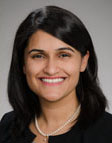
I have been practicing general dentistry for the past 3 years and love my profession! I enjoy teaching and volunteering outside of clinical work. I am also of Indian origin and spent the majority of my childhood in Dubai and Muscat. Living in different countries has helped improve my communication skills and build cultural competency.
Image Description: Picture of me in a suit and smiling widely.
1. What does health equity mean to you?
Health equity to me means having no barriers in accessing compassionate and comprehensive care, no matter who I am, what I look like, and if I have a disability or need accommodation.
2. How do you plan on promoting health equity within your community?
One of the barriers to promoting equity in dentistry is the lack of training and inaccessibility to resources for dentists. My LEND leadership project lies in creating a robust handbook with information on advocacy, volunteering, clinical and behavioral support tools, that any general dentist can utilize in their practice, and thereby expand services to children and adults with disabilities in their community. I plan to use this handbook myself, when I open up a practice in San Francisco, later this year.
3. What are your professional and/or personal goals as an Emerging Leader within and outside the AUCD Network?
My goal is to have a practice that creates a truly welcoming and comfortable environment for children and adults with disabilities, and that this practice becomes the foundation and inspiration for many others in the country. My personal goal is to be a compassionate provider and to solve the eternal question of how my efforts can impact and help more people.
Anisha Srinivasan
Discipline: Developmental-Behavioral Pediatrics
Washington LEND
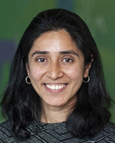
I am a developmental-behavioral pediatrics and health services research fellow. I am also a mother, child, sister, immigrant, and first-generation college student. My work is fueled by the health care experiences of my family, patients, neighbors, and community members.
Image Description: A woman with shoulder-length black hair. She is smiling at the camera. She is wearing a black blouse and standing against a green background.
1. What does health equity mean to you?
As a pediatrician, health equity to me means that all children and youth have access to the healthcare they need, feel respected and valued by the healthcare system, and do not experience avoidable and unfair health conditions due to their social, demographic, or economic backgrounds.
2. How do you plan on promoting health equity within your community?
I am committed to working within our community to critically examine and advocate for healthcare practices and policies that center the needs and values of multicultural children with disabilities and their families.
3. What are your professional and/or personal goals as an Emerging Leader within and outside the AUCD Network?
Professionally, my goal is to develop and implement a model of care delivery for children with disabilities that are embedded in the community and reduces the barriers to getting care at a tertiary medical center. Personally, my goal is to always fold in self-care, compassion, and joy into what I do to not lose sight of what matters.
Ida Winters
Discipline: Family
Waisman Center (WI LEND)
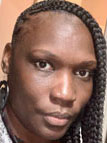 I am a mother of three young men who have special healthcare needs and one of which lives with autism. I work for Mental Health America WI. Next Step Clinic as a Family Navigator and I facilitate a monthly support group for ASSEW. I am a leader in my community, and I care about what happens or decisions being made in my community.
I am a mother of three young men who have special healthcare needs and one of which lives with autism. I work for Mental Health America WI. Next Step Clinic as a Family Navigator and I facilitate a monthly support group for ASSEW. I am a leader in my community, and I care about what happens or decisions being made in my community.
Image Description: Headshot of Ida Winters (black female with long braids to the side and black unity earrings).
1. What does health equity mean to you?
What health equity means to me is a system that provides an integrated system of care across agency lines by considering the client's life cycle through all of the serving agencies (police, social service agencies, behavioral healthcare, healthcare, and other agencies) and ensuring that clients don't fall through the cracks. Health equity means that my family and I can see a qualified provider in our community, we have access to fresh fruits and vegetables, no lead in our drinking water, safe affordable housing, and schools. Everyone has the option and opportunity to be as healthy as possible and the best person that they can be! Health equity means early identification, intervention, referral, evaluation, diagnosis, and support for all children.
2. How do you plan on promoting health equity within your community?
How I plan on promoting health equity within my community is by continuing to work at Next Step Clinic as a Family Navigator who works closely with families who has a child/children who have been identified, service providers, intervention specialist, and students who will be future providers. I will continue to educate the family on the importance of early identification, health, mental health, and dental care and what good healthcare should look like. I will as continue to use the knowledge and skills that I learned from LEND this year. I will continue to sit on boards inside and outside of my community and serve as a bridge to connect my community, other communities, and professionals. I have partnered with some community leaders and we will be starting a community garden that will teach families to grow, harvest, store, and prepare fresh fruits and veggies all at no cost to the community. I am advocating for Marquette School of Dentistry to automatically accept and service families that have children with special needs and disabilities.
3. What are your professional and/or personal goals as an Emerging Leader within and outside the AUCD Network?
My professional and personal goals as an Emerging Leader within and outside of the AUCD network are to form a network that educates and assists underserved, underprivileged, and underrepresented people with special healthcare needs and disabilities to understand what good equitable healthcare should look like. Eliminate the need for code words to get someone in the door and having to have connections to get quality healthcare. Bring together healthcare professionals, educators, students, law enforcement, the faith community, community leaders, families, and people with disabilities and show everyone where they are all similar in some way and how we all can work together to achieve optimal health. I would love to continue to be a mental health advocate and support for families who are struggling with obtaining a diagnosis or receiving a diagnosis.
Markayle Schears
Discipline: Public Health/Medicine
Waisman Center (WI LEND)
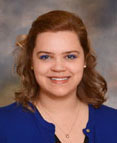
Hello! I am a second-year public health graduate student and LEND Trainee, studying at the University of Wisconsin - Madison School of Medicine and Public Health. Next year, I will be starting medical school there as well! I’m very interested in learning about ways to be a holistic, informed healthcare provider to individuals with disabilities and their families.
Image Description: Markayle, female, is smiling, against a grey background, wearing a black dress with a jet blue cardigan.
1. What does health equity mean to you?
To me, health equity is a concept rooted in public health and the social justice framework. It is the idea that all humans have a right to equitable healthcare and that the systems in place are responsible for facilitating this basic and necessary right. Health equity is meeting the unique needs of individuals of all cultures, abilities, creeds, genders, races, and ethnicities on a population level.
2. How do you plan on promoting health equity within your community?
As a public health student and aspiring physician, I am driven to explore the nexus between public health and clinical medicine as it impacts children with developmental disabilities and their families. In this stage of my training and career path, I am most eager to understand the physician's role in equitable family-centered care from historical and modern-day perspectives. I envision myself contributing to the lives of CSHCN as part of their care team. Additionally, I plan to continue participating in advocacy work for policy changes that help individuals and populations with disabilities both by utilizing my public health training and future clinical skills. I strive to have the knowledge base and skillsets to guide my public health and clinical medicine peers and mentee's efforts to benefit patients with disabilities through teaching and research opportunities.
3. What are your professional and/or personal goals as an Emerging Leader within and outside the AUCD Network?
As a future physician leader and patient advocate, I will have the chance to care for individuals with special needs in my community. I believe that interprofessional collaboration and advocacy for patients with special needs and their families is critical in the clinical setting. My task will be to work closely with an interprofessional team to address the health care needs of each unique patient with disabilities and use my skills to connect them with available resources. I expect to partake in inclusivity training and ultimately, will be responsible for the level of care and awareness I bring to each patient's circumstance. I plan to promote health equity within my community as a physician who is prepared to serve patients with a broad range of abilities and to think critically about the best ways to advocate for community-level, clinical improvements for children with neurodevelopmental disabilities and their parents.
Mustafa Rfat
Discipline: Social Work and Public Administration
Center for Excellence in Disabilities at West Virginia University
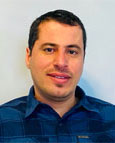 Mustafa Rfat is a graduate student and a trainee at Leadership Education in Neurodevelopmental Disabilities (LEND) at West Virginia University. He is a passionate advocate for equal rights for people with disabilities. Mustafa came to the U.S. as a refugee from Iraq in 2011. He is currently pursuing a Master's in Public Administration and will start his Ph.D. in Social Work at Washington University. His research focuses on refugees with disabilities access to education and training.
Mustafa Rfat is a graduate student and a trainee at Leadership Education in Neurodevelopmental Disabilities (LEND) at West Virginia University. He is a passionate advocate for equal rights for people with disabilities. Mustafa came to the U.S. as a refugee from Iraq in 2011. He is currently pursuing a Master's in Public Administration and will start his Ph.D. in Social Work at Washington University. His research focuses on refugees with disabilities access to education and training.
Image Description: A male wearing a dark blue shirt.
1. What does health equity mean to you?
Health equity is achieved when the systems recognize the unique needs of every member of society.
2. How do you plan on promoting health equity within your community?
I believe community partnership is key in providing health equity. For example, healthcare leaders engage in discussion with community leaders to ease barriers to accessing services.
3. What are your professional and/or personal goals as an Emerging Leader within and outside the AUCD Network?
I just got accepted into Washington University Ph.D. program in Social Work and I plan to research the unique needs of refugees with disabilities.